
christianstandard.com / $3.25 MY RISKIEST MOVE Testimonies from 5 Leaders, p. 32 SLOW TO TWEET Eddie Lowen, p. 57 VICTORY OVER DEATH Mark Atteberry, p. 50 THE BIBLE & FEAR n THE FIRST CHURCH & FEAR n HUMILITY, PRIDE, & FEAR RESOURCING CHRISTIAN LEADERS APRIL 2017 ® H ow to resist a culture of fear
 Mark A. Taylor, Publisher and Editor
Mark A. Taylor, Publisher and Editor
 Jim Nieman, Managing Editor
Rosemary Mitchell, Editorial Assistant
Teresa Callahan, Marketing and Advertising Manager
Scott A. Ryan, Design Consultant
Cover image ©iStock/Thinkstock
Jim Nieman, Managing Editor
Rosemary Mitchell, Editorial Assistant
Teresa Callahan, Marketing and Advertising Manager
Scott A. Ryan, Design Consultant
Cover image ©iStock/Thinkstock
For Customer Service, phone 1-800-543-1353
All Scripture quotations, unless otherwise indicated, are taken from the HOLY BIBLE, NEW INTERNATIONAL VERSION® NIV®. Copyright ©1973, 1978, 1984, 2011 by Biblica, Inc.™ Used by permission of Zondervan. All rights reserved.
Subscription Information
To order Christian standard for yourself, your church, or your group, go to christianstandard.com or contact Customer Service. To one address, per copy: Annual Quantity Price/Each Issue
1
2-34
35-49
50-99
100+
All prices include domestic postage. CUSTOMER SERVICE: 800-543-1353 info@christianstandardmedia.com
Our Permission Policy
Christian standard grants permission to reproduce up to 1,000 copies of articles in this issue (excluding Seen & Heard items) for ministry or educational purposes (church newsletters, classroom or workshop handouts, etc.) with the following provisions: (1) Copied material must be distributed free of charge. (2) The following credit line must appear on each copy: “This article first appeared in Christian standard on [date].”
Letters to the Editor
Letters regarding the contents of the magazine will be considered for publication in “Readers Write” unless specifically marked “not for publication.” Published letters may be shortened to meet editorial requirements. Letters must be signed, but names will be withheld upon request.
Freelance Submissions
We accept freelance submissions, double-spaced, typed on one side of the page only. Include a self-addressed stamped envelope (SASE) for return of unused manuscripts.
E-mail Microsoft Word attachments to address below.
Volume CLII. Number 4. Christian standard (ISSN 0009-5656) is published monthly by Christian Standard Media at 16965 Pine Lane, Suite 202, Parker, CO 80134. Periodicals postage paid at Parker, CO, and additional offices.
Printed in U.S.A. Postmaster: Send address changes to Christian Standard Media, 16965 Pine Lane, Suite 202, Parker, CO 80134. Phone: 1-800-543-1353. Subscribers: Send address changes to Christian standard 16965 Pine Lane, Suite 202, Parker, CO 80134. Send old and new addresses, complete with zip numbers, at least six weeks before delivery date. This publication is available in microform from UMI; call 800-521-0600. Christian standard is published by Christian Standard Media, www.christianstandardmedia.com.

Copyright ©2017 by Christian Standard Media.
E-mail: christianstandard@christianstandardmedia.com
Website: christianstandard.com
BY MARK A. TAYLOR
With the acquisition of Christian Standard Media, announced February 10 (see p. 5), it’s only natural that some readers may have some questions. Here are some answers.
Acquisition? Who acquired you?
Christian Standard Media, consisting primarily of The Lookout and Christian Standard magazines, was acquired by The Solomon Foundation. Solomon created a wholly owned, independent, nonprofit subsidiary that will manage this ministry.
Solomon is in Denver, right? Does this mean you’ll be moving there?
No, and yes. It is true that we have a new business address:
16965 Pine Lane, Suite 202 Parker, Colorado 80134
All correspondence for the magazines, including that for any magazine staff member or any inquiries about subscription fulfillment, should go to that address.
You also can continue to phone us at 800-543-1353.
Or you may continue to write us at any of the e-mail addresses you have used before. For example, reach the Christian Standard staff by writing christianstandard@christianstandardmedia.com.

While the magazines’ business will be handled in Colorado, my colleagues and I are working from Cincinnati. We don’t see a moving van in our future!
What do you see for the future?
We’re not prophets, of course, but for the first time since the 1950s, these magazines have owners fully committed to and engaged with our fellowship of Christian churches and churches of Christ. For the first time in all those decades, we are responsible only for our ministry, not to shareholders. We can’t exist, of course, if we don’t receive income. But our goal is our mission to the churches, not turning a profit.
What does this mean editorially? Who controls your content?
The editors will continue to control our content. Doug Crozier, chief executive officer with The Solomon Foundation, has repeatedly said the magazines will be independent. His goal, and ours, is to serve our whole fellowship of churches.
So you feel pretty good about this, right?
We couldn’t be happier with the huge investment of time and energy from The Solomon Foundation to make this transition happen. Because of their initiative, subscribing to the magazines will be easier than ever. Because of their hard work, a mountain of data and a long list of processes are being transferred as well as possible. Every concern of our staff has been addressed in ways that make us smile. We are grateful to The Solomon Foundation for its commitment to the church, expressed now with this commitment to Christian Standard Media.
Mark Taylor posts every Tuesday at christianstandard.com.
FROM THE EDITOR FAQ
APRIL 2017 1
Founded 1866 by Isaac Errett
Devoted to the restoration of New Testament Christianity, its doctrine, its ordinances, and its fruits. The Staff
$24.99 $16.49 $15.74 $14.99 $14.24
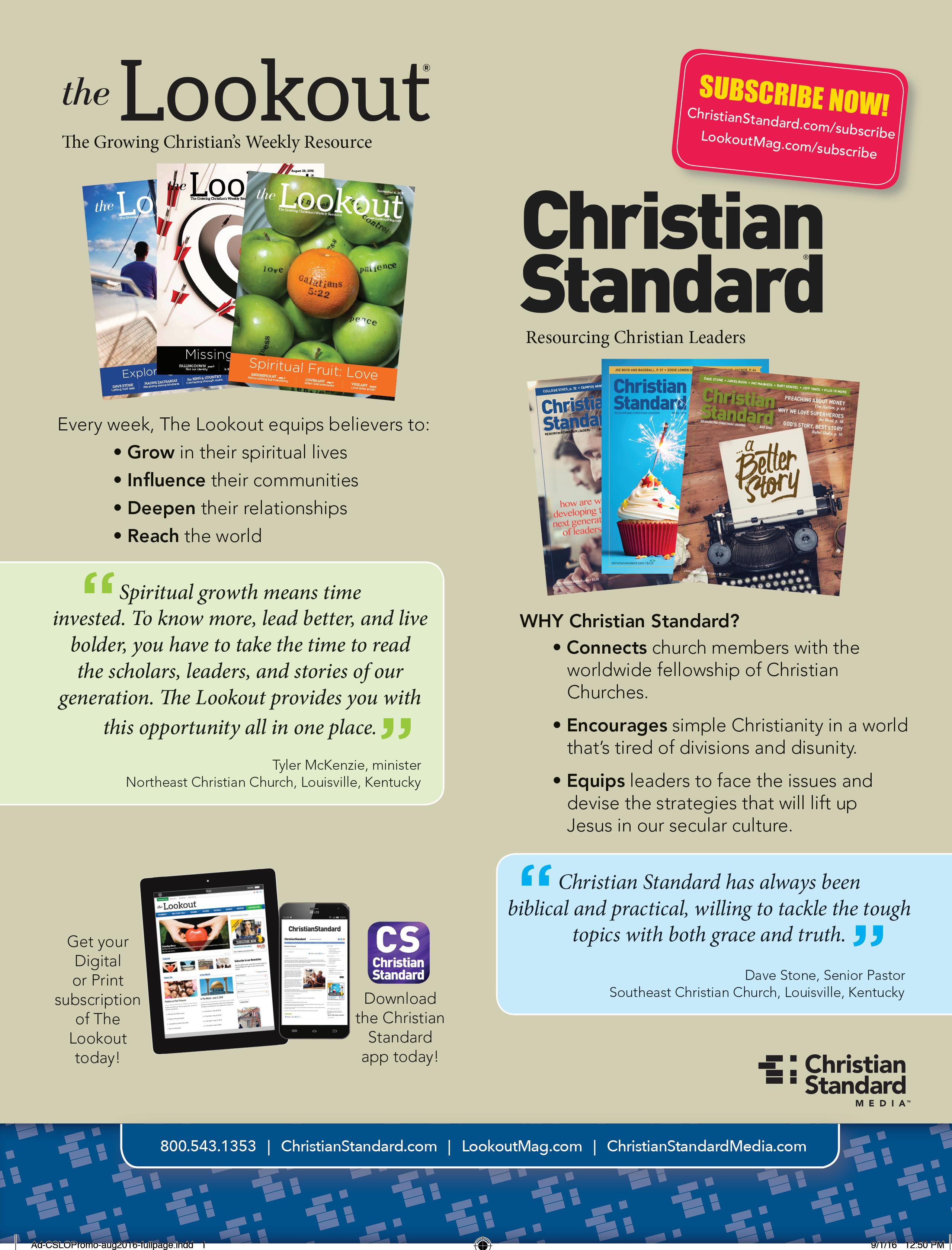 By Aaron and Diane Lincoln
By Aaron and Diane Lincoln

 By Jeff Faull
By David Wright
By Timothy W. Ross
By Jeff Faull
By David Wright
By Timothy W. Ross
40
By Anna Batyuto
44
By Daniel Schantz
By Vince Antonucci,
By T.R. Robertson
By Eddie Lowen
By Justin Horey
Mark Atteberry
10 Why Are You So Afraid? The culture of fear is prevalent in America.
THIS MONTH
12 Holy Risk Taking risks is inherent in following God.
15 The Battle is the Lord’s Ministering to troops battling rebels in Ukraine.
17 Signs of the Apocalypse Finding hope in apocalyptic prophecies.
20 She Loves and Knows Him Serving Christ in a Muslim country.
22 Fighting Fear with Fear There’s wisdom in choosing the right thing to fear.
27 Holy Boldness Christians throughout history have risked it all. By Jerran Jackson and
Jackson 30 ‘Faith Up’ to Your Fears ‘Do not be afraid’ is a thread throughout Scripture. By Doug
Website : christianstandard.com E-mail: christianstandard @christianstandardmedia.com Subscriptions/Customer Service: 1-800-543-1353 32 54 EVERY MONTH Your Church 57 Ministry Today — Think before you tweet. 60 Best Practices — What to do the Sunday after Easter. Notable & Quotable 1 From the Editor — About our acquisition. 6 4C’s — Changing the solution. 8 Seen and Heard — Celebrities’ power to influence social change. 46 At His Table — Misfit convention.
Culture Watch — Keeping our politic local.
From My Bookshelf — Personal dramas, universal issues.
Preaching — The sermon I can’t forget.
A Different Tune — Of bruised reeds and smoldering wicks. RESOURCING CHRISTIAN LEADERS ® APRIL 2017 3 CONTENTS APRIL 2017 Volume 152 Number 4
Lareesa
Redford
54
55
59
64
Move
for God
32 The Riskiest
I’ve Made
Five leaders tell about what God did when they took big risks.
Laurie Montague, Greg Lee, Rusty Russell, and Tamara Munroe
Do Not Call Conspiracy . . .
must be experts at discernment.
We
Fear Knot
fear,
How to untangle boldness,
and pride.
Safety and Security on Sundays
Beyond
47
and
How churches are protecting property and people.
Victory
50 Our Overwhelming
Biblical experience, testimony affirm our reasons to celebrate Jesus. By

New Owners for Christian Standard Media
Editor’s note: Here are the facts about the recent change of ownership for Christian Standard Media. Also see the editor’s column on page 1.
The Solomon Foundation (TSF), a church extension fund serving the Christian churches and churches of Christ with headquarters in Parker, Colorado, has acquired Christian Standard Media, according to TSF Chief Executive Officer Doug Crozier. Christian Standard Media, consisting of The Lookout and Christian Standard magazines, has continued to operate under ownership of the Wicks group since December 2015 when its parent company, Standard Publishing, was sold by Wicks to David C. Cook, an Evangelical publisher.
“Christian Standard and The Lookout, so important to the Christian churches and churches of Christ for 15 decades, are now residing where they belong,” Crozier said, “with a ministry also committed to the congregations in this fellowship.”
“We’re delighted by this opportunity to grow in our service to the churches,” said Mark A. Taylor, publisher.
PUBLISHING COMMITTEE
(Established 1956 by the National Christian Education Convention for liaison with the management and editorial department of Standard Publishing)
Steve Wyatt
Chairman, Phoenix, Arizona
Clark H. Tanner
Vice Chairman, Wichita, Kansas
Marshall W. Hayden
Secretary, Worthington, Ohio
Alan Ahlgrim
Longmont, Colorado
Dennis Bratton
Gallatin, Tennessee
Aaron Brockett
Indianapolis, Indiana
Ben Cachiaras
Joppa, Maryland
T. C. Huxford
Savannah, Georgia
E. LeRoy Lawson
Johnson City, Tennessee
Eddie Lowen
Springfield, Illinois
Crozier stressed that the magazines will operate as an independent, nonprofit ministry, Restoration Movement Media, a Colorado nonprofit corporation continuing to serve as many congregations, ministries, and Christian leaders as possible. While the magazines’ business will be conducted from the Colorado office, the editorial staff will continue to operate from Cincinnati, Ohio. Taylor is editor of Christian Standard, and Kelly Carr is The Lookout editor.
Christian Standard was founded in 1866 by Isaac Errett, whose family owned the magazine, which grew into Standard Publishing. The Lookout began publication in 1894. The Errett heirs sold the business to a Christian businessman in 1955, and it became the cornerstone of a multinational corporation finally known as Standex International. Standex sold Standard to Wicks in 2006.
Christian Standard Media will continue to serve readers through the two print magazines, their three websites ChristianStandard.com, LookoutMag.com, and ChristianStandardMedia.com, as well Christian Standard’s digital editions, available through a widely distributed app for phone or tablet.

CONTRIBUTING EDITORS
Pat Magness
Milligan College, Tennessee
Steve Moore
Meridian, Idaho
Dudley Rutherford
Porter Ranch, California
Dave Stone
Louisville, Kentucky
Teresa Welch
Joplin, Missouri
Contributing editors help define the focus of Christian standard, identify issues facing volunteer leaders and staff members in churches we serve, and suggest future themes. They periodically write for the magazine and regularly consult, advise, and react to the editors regarding past and future content in the magazine.
Becky Ahlberg
Anaheim, California
Ben Cachiaras Joppa, Maryland
Arron Chambers
Greeley, Colorado
Glen Elliott
Tucson, Arizona
Jeff Faull
Mooresville, Indiana
Phyllis Fox
Milligan College, Tennessee
Randy Gariss
Joplin, Missouri
Jennifer Johnson
Levittown, Pennsylvania
Doug Priest
Indianapolis, Indiana
Matt Proctor
Joplin, Missouri
Jim Tune
Toronto, Ontario
APRIL 2017 5
FOUR
Changing the Solution for the Needy in Champaign C’s
Like many organizations committed to helping people in need, Salt & Light Ministries in Champaign, IL, began by giving away food, clothing, and other items. Unlike many of those organizations, however, Salt & Light eventually changed its structure and its systems to empower people to meet their own needs—and the ministry is thriving.

“For years we did the ‘free stuff’ model,” says Lisa Sheltra, associate director. “In fact, we were the largest emergency food pantry in Champaign County, feeding hundreds of households each week. But we still ran out of food and had to turn people away, and we realized that no matter how much we increased our capacity, we’d never have enough.”
The leadership team began to read books like When Helping Hurts and Toxic Charity and to ask what it really means to help people.
“Many of the families came every week,” Sheltra says. “These families were not in
an emergency situation; an emergency doesn’t happen
Christian Churches & Churches of Christ
every Wednesday for six years. So we started to ask, ‘What is the need?’ People needed to shop for food to feed their families, but the solution we offered was a handout. Our solution didn’t meet their need, so we changed the solution.”
Today Salt & Light invites people to volunteer at their own facilities or at more than 60 other organizations throughout Champaign. Each “member” who volunteers can earn up to $165 in store credit every month by volunteering up to 20 hours. Each hour worked is valued
at $8.25, and the credit can be used to purchase clothing and household items in the thrift store or food from the food coop. Both stores are also open to the public.
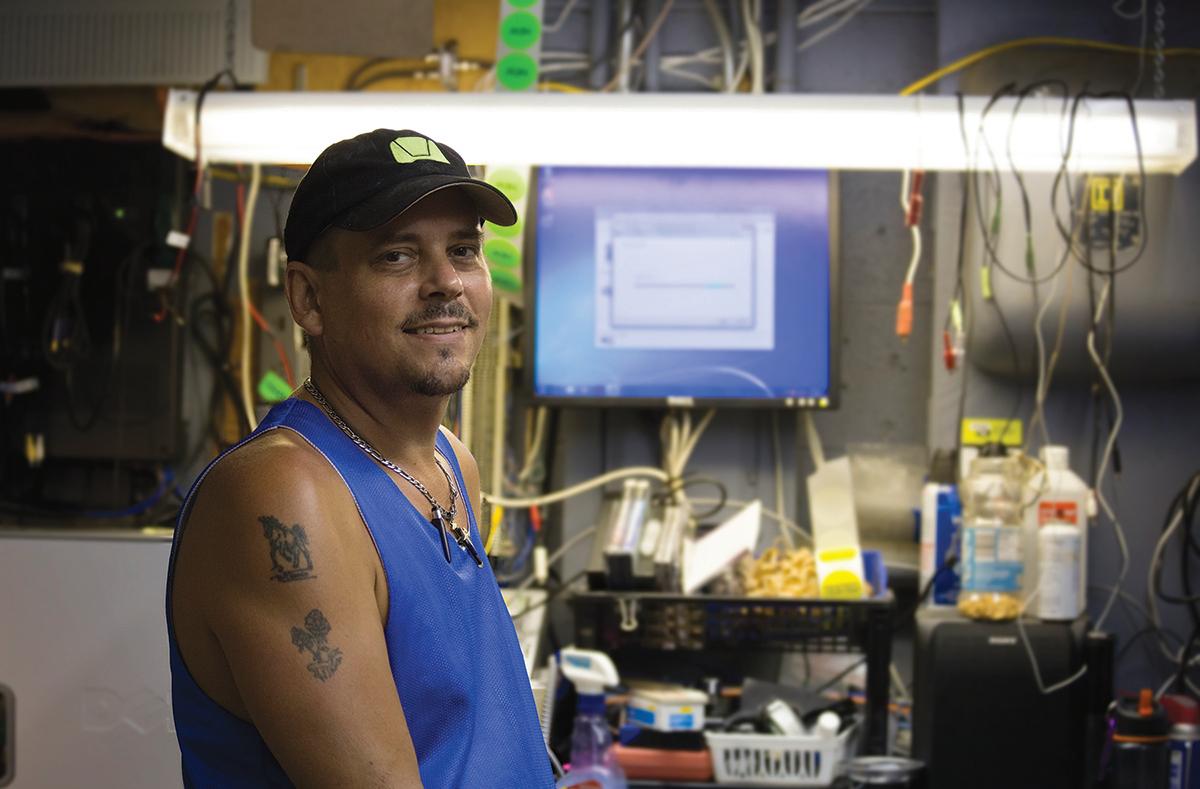
This system not only gives dignity to every person involved, it also allows the members to choose their own food based on the needs and preferences of their families.
“People assume that if you’re getting a handout, you’re lazy,” Sheltra says. “But I’ve found the opposite to be true. People are excited to join this program, and they work hard as volunteers. If
6 CHRISTIAN STANDARD
The relationships built among volunteers, members, and regular customers create a shared sense of community at Salt and Light.
Volunteers and staff prepare electronics, appliances, and other household items to be sold.
you’re going to stand in line for five hours for a pre-packed bag of stuff I picked out for you or work five hours so you can shop for yourself, most people will gladly work and shop.”
In addition to these programs, Salt & Light also created a personal development plan that trains volunteers to be “allies” who listen, ask good questions, suggest growth steps, and mentor individuals and couples who are struggling.
“Many people we work with don’t have a support network, and they need someone to talk to,” Sheltra says. “Others want help with specific goals like finding a job or writing a resumé.”
The ministry also offers a Faith and Finances class that teaches money management skills; a Jobs for Life training course to help adults understand their identity, develop their character, and grow in a supportive community; and even a computer lab with computer help available by appointment.

Sheltra says Salt & Light’s work has the potential to change lives, change communities, and change the way we think about that “free stuff” model. Instead of pouring money into giveaways, this approach uses the same dollars to encourage personal responsibility and hard work.
“Our members are earning what they need while developing our community in significant ways,” she says. “They’re earning credit by volunteering in our nonprofits and our schools—the same schools where many of our high-risk students need help! So we’re not only breaking even financially, we’re helping to solve problems in education, employment, and other sectors. It’s revolutionary.”
www.saltandlightministry.org
Coming Near My Take
One of the most commonly quoted verses from Eugene Peterson’s The Message Bible is John 1:14: “The Word became flesh and blood, and moved into the neighborhood.” This metaphor for the incarnation is referenced so often because, like all good poetic language, it succinctly describes a profound truth: Jesus not only came to earth to be with us, he came to be one of us.
Following Jesus means following his example and “incarnating” the gospel in our own neighborhoods. Sometimes this means tutoring children or planting a church. For Salt & Light, it meant offering opportunities to work.
“We used to start distributing food at 1:00 in the afternoon, and people would begin standing in line to receive it before 8:00 in the morning,” Lisa Sheltra told me. “They spent their day standing out in the pouring rain waiting for a handout, and we spent our day trying to work while watching them shiver in the cold. That system was obviously difficult for the people needing food, and it also required us to detach ourselves from them.”
Sheltra and her team at Salt & Light did not set up this process because they consciously felt superior to the people they served. Their goal—to provide healthy food to the hungry—was honorable, and they could have felt good about the thousands of people they helped each month.

However, they realized this system created unhealthy divisions between those giving help and those receiving it. So they refocused on the real needs of the people they were trying to serve. They invested in their lives and invited them into the work, and now there are no lines, no giveaways, and no ‘us here’ and ‘them there.’”
By Jennifer Johnson
In God Is in the Manger, Dietrich Bonhoeffer wrote, “God is near to lowliness; he loves the lost, the neglected, the unseemly, the excluded, the weak and broken.” We try to love “those people,” too, but without coming near, and certainly without acknowledging we are also weak and broken. It is less risky to remain separate, to assign labels, and to feel gratified by our charitable giving.
The genius of Salt & Light’s ministry is not only that people have the dignity of earning money, but that they’re doing it by working with professionals across the city and spending their credits in a store open to the community. Instead of a handout or even a “handup,” Salt & Light simply offers an open hand that welcomes everyone.
God sent Jesus to understand our pain, invest in our lives, and invite us into his work. The creator of the cosmos showed his love by leaving Heaven and moving into the neighborhood. It’s time for us to get better at sharing his love by leaving our comfort zones and connecting with our neighbors.

APRIL 2017 7
—Jennifer Johnson A member checks out with her groceries and other items at Salt and Light’s food co-op and thrift store.
BY SIMON J. DAHLMAN
Professor of Communications Milligan College, Tennessee
Lighten Up
“No one is useless in this world who lightens the burdens of another.”
Charles Dickens (1812–70), English author
“He who is dying of hunger must be fed rather than taught.”
Celebrity News and Social Change

New evidence suggests that celebrity news can be an agent in social change. After analyzing 400 cover stories of People magazine to find out how the publication reflected attitudes about pregnancy, a sociologist concluded that celebrity news helped to destigmatize out-of-wedlock childbirths.
The first People magazine cover that showed a celebrity pregnancy came in May 1976, which featured actress Goldie Hawn. The text made it clear that she was pregnant and unmarried, but the caption reads, “She’s laughing with a baby and a new hubby on the way.”
While few nonmarital pregnancy stories appeared in the 1970s, when they did there was almost always a clue that the parent would marry by the time the baby is born, according to Hanna Grol-Prokopczyk of the State University of New York-Buffalo.
“It’s like saying, Don’t worry, readers. They’ll be married by the time the baby arrives,” she says. But by the mid-2000s People magazine regularly showed celebrity couples who didn’t marry by the time the baby was born. These nonmarital births were almost always presented as happy, morally unproblematic events.
Media Depictions of Celebrity Pregnancy and Parenthood, 1974–2014: Erosion or Enforcement of Traditional Family Norms?” American Sociological Association meeting, Aug. 22, 2016

By the Numbers: Religion in Congress
While the share of American adults who describe themselves as Christians declined for decades, the new 115th U.S. Congress is about as Christian today as it was in the early 1960s.
91%
91 percent: Members of the 115th Congress who identify themselves as Christians.
95 percent: Members of the 87th Congress (1961-62) who identified as Christians.
291: Republican members of Congress who identify as Christians. (Out of 293 total; the other two Republicans identify as Jews.)
194: Democratic members who identify as Christians (out of 242).
28: Democratic members who identify as Jews. Other Democrats identify as Buddhists (3), Hindus (3), Muslim (2), Unitarian-Universalist (1), “unaffiliated” or “none” (1). Ten members declined to state their religious affiliation.
“Faith on the Hill,” Pew Research Center, Jan. 3, 2017 (analysis based on data compiled by CQ Roll Call)
8 CHRISTIAN STANDARD
—Thomas Aquinas (1225–74), Italian priest and theologian
Grow Up

“I
Quick Quiz: Faith on Capitol Hill

Which group is most underrepresented in the new 115th Congress, when compared to the general U.S. population?
A. Christians
B. Hindus
C. Jews
D. Muslims
E. Religiously unaffiliated (“nones”)
Answer: E—Nones. While 23 percent of the U.S. population identifies as religiously unaffiliated, only 0.2 percent of Congress—one member—does. Protestants, Catholics, and Jews are overrepresented, while most other religious groups are represented in roughly equal proportion to their share of the U.S. public.
Gifted
“With the gift of listening comes the gift of healing.”
Brain Research to Help Gambling Cravings
Gambling addiction apparently activates the same brain pathways as drug and alcohol cravings, according to a new study. Researchers now think these brain pathways may lead to future treatments for gambling disorder.
The study found that two brain areas, the insula and nucleus accumbens, are highly active when people with gambling addiction experience cravings. Activity in these areas, which are located in the center of the brain and involved in decision-making, reward, and impulse control, has been previously linked to drug and alcohol cravings.

The study, which was conducted by the United Kingdom Medical Research Council, used functional magnetic resonance imaging (fMRI) to compare the brain activities of 19 patients with gambling addiction and 19 healthy volunteers as they were shown various

images, including pictures of gambling scenes, such as a roulette wheel or betting shop.
In the problem gamblers, the insula and nucleus accumbens were highly active when they were shown an image associated with gambling, and they experienced a craving. The study also found that weaker connections between the nucleus accumbens and an area called the frontal lobe in problem gamblers were associated with greater craving.
This work provides vital clues into the biology of gambling addiction, which is still largely unknown, according to Dr. Henrietta Bowden-Jones, one of the study’s coauthors and director of Britain’s National Problem Gambling Clinic.
Researchers are now investigating which treatments may reduce activity in these areas, in an attempt to reduce cravings.
E. H. Limbrick-Oldfield, I. Mick, et al., “Neural substrates of cue reactivity and craving in gambling disorder,” Translational Psychiatry (online Jan. 3, 2017)
APRIL 2017 9
“Talents are best nurtured in solitude; but character is best formed in the stormy billows of the world.”
—Johan Wolfgang von Goethe (1749–1832), German author and statesman
believe that maturity is not an outgrowing, but a growing up: that an adult is not a dead child, but a child who survived.”
Ursula K. Le Guin, American novelist, poet, and essayist
Catherine de Hueck Doherty (1896–1985), Russian-Canadian Roman Catholic social worker
—“Faith on the Hill,” Pew Research Center, Jan. 3, 2017
Why Are You So Afraid?
BY AARON AND DIANE LINCOLN
Traveling between cultures leads to some interesting moments.
“Paper or plastic?” a grocery checker asked us one furlough.
We looked at each other quizzically. “We’re paying with cash.”
Now it was the checker who looked confused. “Paper bags or plastic bags?” was of course the question, but not one we hear in England.
When a stranger (or friend) casually references a line of dialogue from a commercial or TV show, we can be left clueless. And it seems every time we return on furlough, bank card machines have changed. Lots of small differences, that have happened since we were last in United States, make us feel sort of like “rookie” Americans when we return.
Perhaps the flip side of being slightly confused about cultural references (and how to pay for your groceries) is being able to view your home culture with a bit of distance. We are, of course, deeply American in ways we may not even recognize, having grown up on the West Coast. But after living in England for nearly 24 years, we are not quite as American as we once were. So, while we notice external differences in America, we also notice internal attitudes and approaches.
Fear is one of the cultural undercurrents we find particularly striking.
Americans Are Afraid
When we go back to America, we are advised not to sign our bank cards for fear the cards (and our identities) might
be stolen. We are told to watch when we use our car remotes because the electronic codes could be cloned and not to use ATMs at night. Watching the news on virtually any media outlet is apt to raise one’s blood pressure (cue dramatic music): first there is discussion of an event, then commentary on that event, and then discussion of what might possibly happen as
How are we as followers of Christ to live in response to the world around us? Are we to live in fear?
a result of that event. And, of course, the obligatory segment about “what you need to know”—which seems code for “what you need to be afraid of.”
As an example of fear, one need look no further than the recent presidential election in the United States. Can a whole election be based on fear? The 2016 version certainly appeared to be, no matter which candidate you supported.
This element is also at work in England. Note that fear was definitely a factor in the recent Brexit vote (which saw the United Kingdom withdraw from the European Union). England also has news programs long on drama. But the degree and scale of the prevalence of fear in America appears to be markedly higher. We don’t think it can all be put down to stoic Brits always
reacting with “stiff upper lips.”
Many Americans are afraid. They are afraid of identity theft and cancer. They are afraid of home invasion and gun violence, of ISIS and terrorism. Americans are afraid of government intrusion and privacy breaches. They are afraid of genetically modified food, killer clowns, tampered-with Halloween candy, Ebola, and climate change.
More subtle fears preying on the mind include fear of death, of social stigma, of missing out, loneliness, or aging. Americans are too often just generally afraid of the “other”—people whose religion or color or culture is different from theirs.
This certainly isn’t just our observation. Barry Glassner, for example, has written The Culture of Fear: Why Americans Are Afraid of the Wrong Things. Social science researchers also study mental health trends and treatment levels for anxiety. Anxiety disorders are the most common mental illness in the United States, affecting nearly 1 in 5 people; the financial costs from this are staggering, but the huge costs to personal lives are incalculable.
Speaking of costs, we noticed there is big money in fear: insurance, home security, guns, dashboard cameras, huge SUVs, hand sanitizer, gated communities, antiaging cream, home-schooling, vitamins, every type of technology. All of these things can subtly, and not so subtly, be sold to address, escalate, or perhaps even create our fears.
We don’t want to sound naive. There
After more than two decades living in England, these missionaries from America have a question for their fellow citizens.
10 CHRISTIAN STANDARD
are terrible things happening in America, England, and around the world. Very real, tragic, and scary events fill the news in print, on the TV, and in social media. Whether there is more crime and disorder now than in the past, or whether we simply know about it more, is a matter of debate.

Regardless, the question remains: How are we as followers of Christ to live in response to the world around us?
Our Lives, God’s Kingdom
We must live differently. As followers of Jesus who are living out our lives under the rule of God, we demonstrate what life is like in God’s kingdom. We are the living, breathing, talking, and walking example of life under God’s management; we are new creations. We seek “your kingdom come” here and now, on earth as it already is in Heaven.
God’s kingdom does not involve liv-
ing in fear. Scripture is full of verses saying “do not be afraid.” Many passages tell us to live in peace and to be courageous— both qualities on the opposite side of the spectrum from fear.
Instead of fear and anxiety, we are to be filled with the Spirit. Our lives are to overflow in concrete terms with the truth that our security, significance, and identity starts and ends as a child of the King and a follower of Jesus.
The world desperately needs to see a different way of living—one characterized by joy and peace, openness of spirit, and generosity. People need to see an alternative to fear and anxiety.
Fear is a subtle motivator, so we must come honestly before our Father and examine our hearts for actions motivated by fear. When we are prompted by the Spirit to do something, but hesitate, is it because of fear? When we are afraid to reach out to someone, we should remember we do not need to fear. We can give generously and hold our stuff lightly, secure in God who is our provider.
We are ambassadors of the King, filled with his Presence. When circumstances or others around us indicate we should be afraid, we can boldly reject that, opting instead for joy and peace because of who God is. We can watch with expectation that, as we reject fear, a watching world may turn to Christ, the source of our hope.
APRIL 2017 11
Aaron and Diane Lincoln are missionaries and church catalysts for Christian Missionary Fellowship International, Indianapolis, Indiana.
©Lightstock
Holy Risk
BY JEFF FAULL
It’s difficult to find a follower of God in Scripture who did not take big risks. Look at those who brought Jesus into the world. Look at the first church and the ministry of the apostles. How can our ministries and personal lives follow their example?
Famous psychologist Abraham Maslow is best known for his hierarchy of needs pyramid. According to Maslow, the most primal needs we have involve our bodily activities, like breathing, eating, or drinking.
Second only to those needs is the basic human desire for security and safety. We are driven by the desire to feel secure about our surroundings, our future, and our own continued well-being. But what happens when that need for security overpowers everything else?
Part of Jesus’ call to discipleship is to trust God to meet those needs and to seek his kingdom even more than we do our own security. Giving up that fear is easy to talk about, but hard to do.
Yet, with Christ, there has always been an element of risk and danger. After all, the whole thing started with a young engaged couple who chose to believe an angel and

were willing to risk their lives, reputation, and future to become his parents. His first worshippers risked job responsibilities to be the first to see him, and his first wise seekers risked fortunes to find and honor him.
His great forerunner risked everything. His first disciples risked their livelihood and their lives, and his teaching called for his followers to risk it all to gain everything. And that’s all before the church even began.
Every Chapter
After the church began with the apostles’ courageous stand in Acts 2, the next chapter finds Peter boldly confronting his listeners as the murderers of Jesus.
In Acts 4, Peter and John are arrested and interrogated and forbidden to preach Jesus, but they do it anyway. Their mindset was simple:
“Which is right in God’s eyes: to listen to you, or to him? You be the judges!
As for us, we cannot help speaking about what we have seen and heard” (Act 4:19, 20).
Then the church prayed for even more boldness.
“Now, Lord, consider their threats and enable your servants to speak your word with great boldness” (Acts 4:29).
In Acts 5, the apostles are jailed, flogged, and threatened with death. Still they speak.
Chapter 6 contains false accusations and testimony against Stephen for preaching, but he doesn’t back off. It culminates with his martyrdom in chapter 7.
12 CHRISTIAN STANDARD
We are called to seek God’s kingdom more than our own security.
What some avoid is often central to God’s call.
Acts 8 opens with Saul persecuting the church, and chapter 9 has the tables turn, as the newly converted Saul is now the one threatened for his faith.

In chapter 10, Peter boldly goes to the Gentiles with the Holy Spirit.
And as the rest of Acts unfolds, every subsequent chapter reflects the danger and exposure believers faced and the boldness they demonstrated in response.
Some of the risks were more obvious than others. Scripture refers to Barnabas and Paul as “men who have risked their lives for the name of our Lord Jesus Christ” (Acts 15:26). And it’s not just the apostles
who lived boldly. Scripture speaks of people like Aquila and Priscilla who “risked their own necks” for Paul and his ministry (Romans 16:4, New King James Version).
Epaphroditus is described similarly: “Welcome him in the Lord with great joy, and honor people like him, because he almost died for the work of Christ. He risked his life to make up for the help you yourselves could not give me” (Philippians 2:29, 30).
This is a recurring theme in the New Testament. The original church exploded and continued in growth and maturity in an atmosphere and culture of peril
and persecution.
Fast forward two millennia to the contemporary church, especially in America. Our inclination to remove all risk in our insulated and padded church bubbles stands in stark contrast to our spiritual predecessors, and even to our spiritual contemporaries in other locations. Our safetyconscious, risk-averse, self-protection mind-set has seeped into the way we see everything, and it has distorted our understanding of the very nature, definition, and practice of our faith.
APRIL 2017 13 Continued on next page
©iStock/Thinkstock
HOLY RISK
Continued from previous page
But imagine a risk-free Hebrews 11. A risk-free exodus. A risk-free ark construction. A risk-free temple or tabernacle project. A risk-free Abraham, Moses, Noah, David, Mary, Elizabeth, Peter, Paul, Deborah, Amram, or Jochebed.
The parable of the talents is not risk free. The prodigal son’s return and his father’s welcome were not risk free. The creation of humanity was not risk free. Leaving the boats and nets and the tax table were not risk free.
Risk Tolerance
Following Jesus demands risk. “Safety first” may be a great mantra for the construction site, the schoolroom, or the factory, but it doesn’t play well in the kingdom of God.
Consider your risk tolerance for the gospel. Spiritually speaking, are you a person who tries to eliminate, or at least minimize, any element of risk in your life? Do you hold your cards close to your vest and refuse to take any unnecessary chances in life?
Are you like the servant who was afraid and hid his talent in the earth, and when he gave it back it was not acceptable? Do you know what it means to lose your life to save it? Those of us who try to eliminate every risk from our lives often operate out of a fear and protection mentality instead of purpose.
Does that resonate with you at all? Can you feel for Nicodemus who came to Jesus by night? Can you sympathize with the disciples who stayed in the boat? Do you feel for the rich young ruler who wanted to keep a chunk for his retirement? Can you understand the mentality of the Pharisees who were comfortable with their religious systems? Do you have a soft spot for Joseph of Arimathea, the secret disciple? Do you find yourself subconsciously defending the inaction of the priest and Levite who walked by on the other side of the road or the parents of the blind man who didn’t want to lose standing in the synagogue?
Our Ministries, Our Risk
In the book Ten Steps for Church Growth, Donald McGavran and Winfield Arn wrote,
New life and growth are more likely to be experienced when a church is willing to risk and move from the known to the unknown. Such a
move, however, is threatening. Not all . . . are willing to assume risk. Such fear of failure has laid to rest many attainable goals and buried many magnificent visions.
Arn told of a time some people he was working with invited him to try a trapeze they had been using as a prop. Amazingly, he took them up on their offer. He climbed up, grabbed the bar, and swung out into the air. He wrote,
Flying through the air, I made three important discoveries: First, you can’t hold on to one bar while grasping for the other. You must let both hands go and leap! Second, it’s frightening and threatening to let go of your security. Third, you don’t have forever to make up your mind.
The Risks, The Promises
Margie Warrell, author of Stop Playing It Safe, wrote in a recent Forbes article,
Using the latest brain imaging technologies, researchers have been able to prove that we human beings are neurologically wired to over-estimate the size of risks, under-estimate our ability to handle them, and downplay the costs of inaction.
I don’t doubt the general accuracy of her assessment, which doesn’t even take into account the power of Jesus to help us face our fears.
Do you think perhaps we can face the risks involved in following Christ? It may not be as risky as we imagine. Consider the promises that accompany the risk:
• He will be with us always.
Then Jesus came to them and said, “All authority in heaven and on earth has been given to me. Therefore go and make disciples of all nations, baptizing them in the name of the Father and of the Son and of the Holy Spirit, and teaching them to obey everything I have commanded you. And surely I am with you always, to the very end of the age” (Matthew 28:18-20).
• His word will not come back void.
I recently sat down with a financial adviser and took what he called a risk tolerance assessment. The results confirmed what he and I both already knew. I’m way too cautious in my approach. A spiritual risk tolerance assessment will surely be even more revealing. Does God want us to risk . . .
• our own vision of a “successful” church for his plan of a real church?
• our own individual and family security for his promise of true security?
• our own version of “proper” spirituality and doctrine for his unfettered declaration of truth?
• our own definition of a meaningful existence for his description of abundant life?
• our own carefully crafted public image for the image of his Son?
• our own sense of purpose and accomplishment for his ultimate purpose?
What we will find in our contemplation is that he wants us to be willing to risk that which we treasure most. What if Christ asks you to risk your dignity, or your finances, time, or comfort? What if he asks you to risk the familiar? What if he asks you to risk everything?
As the rain and the snow come down from heaven, and do not return to it without watering the earth and making it bud and flourish, so that it yields seed for the sower and bread for the eater, so is my word that goes out from my mouth: It will not return to me empty, but will accomplish what I desire and achieve the purpose for which I sent it (Isaiah 55:10, 11).
• We will be repaid many times over.
And everyone who has left houses or brothers or sisters or father or mother or wife or children or fields for my sake will receive a hundred times as much and will inherit eternal life. But many who are first will be last, and many who are last will be first (Matthew 19:29, 30).
The famous North Carolina preacher Vance Havner was spot-on when he said, “Salvation is a helmet, not a nightcap!”
We have brothers and sisters all over the world who are daily risking everything—even their necks—for the gospel. It’s time for us take off the nightcaps and lead with our helmets.
14 CHRISTIAN STANDARD
Are you like the servant who was afraid and hid his talent in the earth, and when he gave it back it was not acceptable?
Jeff Faull serves as senior minister with Mount Gilead Church, Mooresville, Indiana.
The Battle Is the Lord’s
BY DAVID WRIGHT
Zhenia is a minister and church planter. He is married and has a teenage daughter. He earned an MA in practical theology from TCM International Institute in 2012. He now serves as senior minister for five Ukrainian churches near the Crimean Peninsula.

As a young Bible student at Tavriski Christian Institute, his desire was to “preach to millions.”
“But,” he says, “God told me, ‘If you’re so sharp to preach to millions, you really need to start with something small.’ God blessed us to start one church from ‘zero.’”
Seven other churches that were near closing came under Zhenia’s leadership. Today Zhenia leads five of these churches, and a partnering minister leads the other three.
Shortly after the eight churches were established, Zhenia became concerned for the thousands of Muslims living in his region. Since 2003, Zhenia and others from his churches have shared the love of Jesus with more than 3,500 Muslim neighbors annually through VBS programs and other outreach efforts.
In the Middle of the Conflict
In 2014, when war between Ukraine and Russia began, Ukraine was not prepared.
“We found ourselves in the middle of this conflict,” Zhenia says. “My village is
just eight miles from Crimea, which was annexed by Russia. Thousands of soldiers were sent to our area to protect the border. We began to serve the soldiers.
“God extended our ministry, and now we serve the troops all along the south and east borders, where fullscale war is under way. When we began this ministry, it was relatively safe. But then shooting and bombings came. We were determined to press on with preaching the gospel to the troops.
“The soldiers were ready to hear about Jesus because they were balancing between life and death. They needed to know the way to be reconciled with God. They saw we were endangering ourselves to share Jesus Christ with them. They realized preach-
APRIL 2017 15
Continued on next page
With full-scale war exploding all around him, this man moves ahead with his ministry.
“God extended our ministry, and now we serve the troops all along the south and east borders, where full-scale war is under way.”
Zhenia stands in front of a bombed-out college building in far eastern Ukraine. Russian-supported rebels and Ukraine’s military have been fighting since 2014.
THE BATTLE IS THE LORD’S
Continued from previous page
ers and other disciples of Jesus were willing to risk death to share the good news with them.
“This ministry has brought much kingdom fruit. The soldiers listen eagerly. Sometimes we preach to thousands all at once.”
Zhenia and his crew have distributed more than 10,000 New Testaments and other Christian literature to the soldiers. They have witnessed countless men and women repenting and giving their lives to Christ.

“There are many accounts of God’s powerful action,” Zhenia says. “The soldiers that have become believers now spread the good news.”
For example, Zhenia has a new friend who is a young Christian, leads a brigade, and also serves as the brigade’s press officer. He has influence over more than 5,000 soldiers and their families. This officer’s articles often refer to God and the importance of relationship with him.
Zhenia’s favorite passage of Scripture during this war has been Matthew 25:3146.
“We are engaged in all the activities listed beginning with verse 35. We feed the soldiers and provide drinking water. The soldiers were wandering about, and we took them into our homes so they could sleep and take showers. We do their laundry and provide other necessities.
“We believe that we do this for Jesus.
These soldiers have protected us. We compare them to the shepherds watching the sheep during the night Jesus was born. These soldiers protect an entire nation from enemies. It is our honor to serve them.
“We pray for their bodies and souls, and we urge them to trust in Jesus, the One who cares about them, the One who can protect their souls from sin and their bodies from the ravages of war. This is the only One they need to trust. We teach them to pray. We urge them to build a personal relationship with Jesus. We pray they do not fight out of arrogance, aggression, or vengeance, but to do their job protecting the lives of their families and fellow citizens. We urge them to wage a noble and honorable war.”
Zhenia and his godly associates visit the homes of the soldiers and have gotten to know many of their families. They visit the newly widowed and orphaned, with whom they pray and minister.
Prayers with a Trembling Voice Zhenia was asked about his own safety during these times.
“I go to these places trying my best to be spiritually prepared,” he says. “This can happen only when I spend time with God in his Word. How can the soldiers benefit from our time if those of us ministering to them are empty?
“However, there have been times when
I am truly frightened. Shooting is taking place. Cars are being blown apart, and terrorists are all around. I pray for all to be safe. During these explosive moments when danger is extremely high, I shout prayers with a trembling voice. My prayers are pleas for protection and deliverance.
“Years ago, before I became a Christian, my experience with fear was different. I felt hopeless, empty, and full of despair. Many of our soldiers who do not know Jesus feel this today.
“Now, even if fear comes over me, I know I am not alone. There is a calm deep inside that is hard to explain. I believe God’s supernatural power calms and brings hope. I believe it is the work of the Holy Spirit. I also realize I am more successful in combating fear when I am surrounded by God’s people.
“I know that Jesus is with us during each battle,” Zhenia says. “I believe he is with us in the calm and in the storm. My hope and prayer is to share him with as many of these soldiers as I can. I pray that he calms the hearts of those who serve him no matter what is happening.
“Frightened? Yes, at times the fear is extreme. But our Lord is greater than any fear this world may bring us. I will fear no evil (Psalm 23:4), because I know God is with us.”
16 CHRISTIAN STANDARD
David Wright serves as vice president of ministry services at TCM International Institute, Indianapolis, Indiana.
Zhenia and another minister stand with members of a Ukrainian Army battalion.
Signs of the Apocalypse?
BY TIMOTHY W. ROSS
How did the presidential election turn out for you? How are you feeling about the realities of Washington in 2017?
Regardless of our politics and pref erences, we all have probably been bruised by the news of recent months. As they say in West Africa: “When el ephants fight, all the grass suffers.”
Whether your buttons are popping with pride at the success of the Trump Revolution, or whether you are still checking real estate prices in Canada, the Word of God has an apocalyptic message for us. Apocalyptic Scriptures are charged, vivid, sometimes hardto-understand pronouncements that interpret the times and look toward a momentous, sometimes catastrophic, always dramatic future.
Apocalyptic prophecies were of fered to help specific people hang on during very tough times. We do well to read them first as a message to their original hearers, but as we peer “over their shoulders,” perhaps they reveal something of our future too.
The disciples followed Jesus in and out of the temple grounds in the last days of his life. They didn’t know how Jesus’ “election” was going to turn out, but they assumed they were on the cusp of a monumental victory. Perhaps they were even “measuring the drapes,” thinking of their own ascension to power.
Luke 21:5-19 records that some were “speaking about the temple, how it was adorned with beautiful stones and gifts dedicated to God.”1 The Greek word adorned is also defined as “ordered.” The disciples were struck by the way the massive walls were ordered just so—every stone in place, rising one on top of the other to impossible heights.
The solid masonry mirrored the disciples’ mood. Jesus was ready to take over these halls of power, and the disciples were in position to
Apocalyptic prophecies were offered to help specific people hang on during very tough times. We do well to read them first as a message to their original hearers, but as we peer “over their shoulders,” perhaps they reveal something of our future too.
become leaders of the new order. What could possibly go wrong when your candidate could calm the sea, multiply bread and fish, heal the sick, pull money from the mouth of fish, and even raise the dead?
But Jesus likely motioned to the temple before saying, “The days will come when not one stone will be left upon

APRIL 2017 17
The news is filled with upset, confusion, and chaos. Should we be surprised? Should we be afraid? Some of the most frightening Scriptures ultimately can give us hope.
Continued on next page
SIGNS OF THE APOCALYPSE?
Continued from previous page
another; all will be thrown down” (Luke 21:6). All that is “ordered” will soon become “disordered.” All this stability will be destabilized. This monument to religion, this seat of power will be smashed to bits.
“Teacher,” asked the stunned disciples, “When will this be, and what will be the sign that this is about to take place?” (Luke 21:7).
In response, Jesus warned of impending chaos:
“Nation will rise against nation, and kingdom against kingdom; there will be great earthquakes, and in various places famines and plagues; and there will be dreadful portents and great signs from heaven. But before all this occurs, they will arrest you and persecute you; they will hand you over to synagogues and prisons, and you will be brought before kings and governors because of my name. . . . You will be betrayed even by parents and brothers, by relatives and friends; and they will put some of you to death. You will be hated by all because of my name” (Luke 16:1017).
Last Week’s News
I used to read these dire warnings without being touched personally. My little world, like the stones of the temple, was ordered, stable, adorned. I didn’t worry about getting thrown in jail, or my family hating me, or meteors destroying my home. International chaos, planetary upheaval, societal friction, environmental catastrophe, and families splitting apart were the kinds of disasters that affected people in other places.
But what once sounded apocalyptic now sounds like last week’s news. Did you ever expect to hear predictions of global chaos and environmental disaster from a slight warming of our atmosphere? Did you ever expect to hear about earthquakes in places like Oklahoma?
We don’t need Jesus to tell us we live in increasingly restless and even dangerous times. We see it with our own eyes.

Political instability and chaos seem to be the order of the day. Our soldiers fight in distant countries, and veterans struggle to find their footing when they come home. Will a new administration undo climate agreements, overthrow nuclear treaties, and scrap major elements of social programs?
Politicians and newscasters keep us jumpy and suspicious about terrorism, causing us to look for enemies in our midst. Even the fabric of creation—air, sea, and land—seem to be unraveling.
18 CHRISTIAN STANDARD
Tomorrow’s Possibilities
In times like this, apocalyptic Scriptures can confound and frighten us. But they can also fire our imaginations to see new possibilities. Will Willimon writes:
Our apocalyptic vision, our Christian conviction about the end, influences how we live in the present, generating both judgment (for the world as it is, is not all there is) and promise (God is going to finally finish the work that God began in Creation). This means we can live and act in this world because we have a vision that gives us hope for the future. Apocalyptic scripture promises “new heavens and a new earth” and invites people to participate in a coming future that, while it is not dependent upon their success, is open to the labors of their hands.2
Apocalyptic Scriptures invite us to participate in a new future. The prophet Isaiah provides us with another image of that hoped-for future in Isaiah 65. The people of Isaiah’s day lived through some shaky times. They had no idea what tomorrow might bring. Isaiah warned of impending doom, but he also saw a new day ahead when God’s people would be at home, at peace, at rest.
Isaiah’s vision of the future encouraged his hearers to “lean toward the future.” God, said Isaiah, is about to create new heavens and a new earth. No more will the sound of death and dying be heard in Jerusalem. Young men will no longer go off to war. If someone doesn’t live 100 years, folks will wonder what went wrong. Food will be abundant; children will be blessed by the Lord. Indeed, said the Lord,
Before they call I will answer, while they are yet speaking I will hear. The wolf and the lamb shall feed together, the lion shall eat straw like the ox; but the serpent—its food shall be dust! They shall not hurt or destroy on all my holy mountain, says the Lord (Isaiah 65:24, 25).
Today’s Opportunity
Here is where apocalyptic visions for the future bump up against the choices we make today. If we know the way life in God’s kingdom will one day be, why don’t we begin to live that reality right here, right now, in the midst of troubled days?
If there will be peace in God’s kingdom someday, why don’t we say no to fighting and killing right now?
If the lamb and the wolf will lie down together in the coming kingdom, can’t we make peace with the wolves that cause us pain?
If there will be no hurting or destroying in the heavenly kingdom, can’t we teach our children to stand up for our vulnerable neighbors today?
Jesus braced his disciples with heavy doses of reality
and hope. Life is going to get crazy for you and you are going to be completely overwhelmed, but “not a hair of your head will perish. By your endurance you will gain your souls” (Luke 21:18, 19).
Here is what is at stake: your life. Your soul. How you behave when order collapses into chaos is a matter of life and death. There may come a time when your “ordered” life will crumble and you will be buffeted by chaotic forces. Don’t panic. Stand up straight. Keep walking the way of Jesus. Keep doing the right thing.

“By your endurance you will gain your souls.” Don’t give up. When you get knocked down, get back on your feet. Keep moving.
And one more thing, Jesus said. “This will be a time for you to bear testimony” (Luke 21:13, author’s paraphrase). When the heat is on, when order descends into chaos, when trouble comes to your doorstep—or your neighbor’s doorstep— that’s the time to speak up for Jesus.
“When things get really bad,” says Jesus, “keep speaking up for me. Don’t worry about what you’re going to say. I’ll give you the words and the wisdom. You just remember to put in a word for me” (Luke 21:1315, author’s paraphrase).
These dark and troubled days need not testify to the power of death and the triumph of chaos, but they can be for us another step in our journey toward God’s promised Heaven and earth. What the world interprets as chaos and destruction, Jesus reads as opportunity. So lift up your head. Don’t be afraid. Lean toward the future with God. Walk as disciples of Jesus.
Some Americans are filled with optimism, joy, and hope because of this new political climate. If you’re in that number, don’t let it go to your head. Don’t think that political power equals divine favor.
Others face these days with a sense of foreboding and sadness. If you are in that number, get up, wash your face, put on your boots, set aside that Canadian real estate guide, and get on with the work of building, loving, welcoming the stranger, speaking up for Jesus, and pushing for a better tomorrow.
Be the change you want to see. Live as a citizen of God’s kingdom. It’s coming. And nothing can stop it.
APRIL 2017 19
1Scripture verses are from the New Revised Standard Version of the Bible, unless otherwise indicated.
2William H. Willimon, “And Now, the End,” Pulpit Resource, November 14, 2010, pp. 30, 31.
Timothy W. Ross serves as minister with Hopwood Christian Church, Johnson City, Tennessee, and as an adjunct professor with Emmanuel Christian Seminary at Milligan College.
©iStock/Thinkstock
What the world interprets as chaos and destruction, Jesus reads as opportunity. So lift up your head. Don’t be afraid. Lean toward the future with God. Walk as disciples of Jesus.
She Loves and Knows Him
BY ANNA BATYUTO
In a police station, in front of a police officer, is a tiny young woman who looks almost like a child.
“Your mother wants to make the trip to Mecca but can’t do it because you are a Christian. Deny Christ!” The officer says these words again and again. This is not the first time Zulfiya has been in this place.
“You’ve told me that before,” she says, “and what was my answer then? It hasn’t changed.”

This woman’s incredible peace and the awareness of God being near her give her words and inner core a strength even the police officer can feel.
“Maybe I should take you to the basement and have some ‘fun’ with you,” he threatens.
“If my Father allows it to happen, do as you wish,” Zulfiya calmly responds.
How can this woman, who lives in a Muslim country where women are brought up in submission to men and to authorities, stand so firmly and fearlessly against this officer? This officer has no idea the only thing the woman is afraid of is to stop hearing her Lord’s voice!
Underground Ministry
Tavrinski Christian Institute (a Christian college located in the south of Ukraine) has been serving in Uzbekistan for more than 10 years. Although this wasn’t the first time the school staff has heard such stories about our students’ faithfulness to God, their faith always amazes and inspires us.
Since Christians in Uzbekistan are persecuted, TCI carries its ministry there underground. There are some officially registered churches in the capital and other cities of the country, but most of the small congregations are unregistered and cannot be registered. Therefore, believers are forced to meet secretly in small groups in homes. The whole congregation can come together only for weddings or similar occasions.
To put it clearly, to become a Christian for an Uzbek means to lose the respect of your family and society, to be doomed to penalties, calls from the police, and interrogations. Such a person
20 CHRISTIAN STANDARD
©Lightstock
Rejected by family, beaten by officials, this Christian in a Muslim country serves Christ without fear.
doesn’t even have the right to be buried in an Uzbek cemetery. Despite this, the church in Uzbekistan is growing, and faith and love of those people impresses.
Strong Faith
I do not know Zulfiya personally, but was able to “get to know” her by watching the video sent to me via a coded mail. The video was of a sermon she gave as part of a class assignment. Because the video was faulty, at first I heard only her voice. It was soft and friendly. I thought, Only a person whose heart is full of peace can speak and laugh like that.
Then Zulfiya’s image appeared—a pretty young woman. She was slim and tiny, no taller than a child. When she finished preaching and was walking off, I saw she had mobility issues. When she walked, she swayed from side to side.
The swaying, I learned, was caused by injection of an excessive dose of hydrocortisone when she was a child. She was almost scalded inside, causing her to spend five years in bed and all her school years in a wheelchair. I wondered about this tiny woman and what makes her faith so strong.
In 2001, after five years of treatment in an oncological hospital, Zulfiya’s cancer had metastasized throughout her whole body. She was expected to live no more than a few more months. But when the doctor looked at the results of her latest tests, he couldn’t believe his eyes. The tests showed no signs of cancer. Zulfiya told the doctor she had accepted Jesus Christ into her heart. She remembered the day, a week after her repentance, when she heard a soft voice say: “I want you to depend only on me, not on your medicine.”
At first her relatives wouldn’t let her stop the medicine, but Zulfiya’s stomach just couldn’t tolerate it anymore. Then the same voice told her, “I want you to depend only on me!” The doctor and Zulfiya’s mother didn’t take her words seriously, but they rejoiced for her recovery.
The difficulties began, however, when the girl started witnessing about her faith in Christ to everyone. People from the mosque began visiting her family and shaming her parents. Zulfiya was summoned to the police station to be questioned about her faith. She was beaten there, and she was fired from her job.
In the end, though they knew of Zul-
fiya’s love for them and had witnessed God’s miracles in her life, her family was forced to deny her and send her away from home. In all these circumstances, Zulfiya, though a new Christian, remained faithful to God.
Effective Ministry
Zulfiya had nowhere to go and nothing to live on, so she settled in the church. She became actively engaged in serving others. For the sake of the ministry, sometimes it was necessary to visit local or highranking officials. Zulfiya would make those visits. When she made requests, she often would be asked, “Where are you from? Whose daughter are you?” Kinship and family are very important in that country.
Zulfiya would smile and usually reply, “Let’s start with this,” and she would tell them about her heavenly Father. She believes that every knee will bow to the name of Jesus, and that her faith in God opens
How can this young Christian woman stand so firmly and fearlessly against this police officer?
the doors of the highest-ranking officials. Moreover, these officials respect this little Christian woman, let her pray for them, and ask her about God’s message for their lives. They see in her the power of her God! Of course, some officials have a negative attitude toward Zulfiya, but only a few.
So, whenever there is a need, she continues to boldly go to the offices of officials, because she believes her God is going before her, and she testifies about his glory alone!
TCI professors met Zulfiya four years ago during the school’s fourth enrollment of students at its Uzbek educational center. Zulfiya was a freshman. At that time, she knew she needed more knowledge to better serve the people. She believed God would mold her through the training.
Over these last few years of study, Zulfiya has become more responsible and consistent in her prayer life. She has a wider and deeper understanding of Scripture, and she sacrifices more for God.
Zulfiya now leads two Bible study groups and a prayer group with codepen-
dent people. She also works with children from an orphanage.
Bold Witness
One day, Zulfiya’s appendix burst, but she continued serving God for four more days until she fainted.
At the hospital, while being carried into the operating room, the doctor told her, “You are dying. You are already dead.”
“Thank God,” she replied. “I am going home to my Dad.” The doctor was puzzled. In his 25 years of practicing medicine, she had lived longer with a burst appendix than any person he had seen. Even after the eight-hour surgery, the doctor fully expected her to die. But she survived, although she spent three months in the hospital.
Again and again, the doctor witnessed what an extraordinary person Zulfiya is. Meantime, Zulfiya was praying for the doctor’s repentance.
Once while changing her dressing, he sat on her bed and said he couldn’t understand why his conscience had been tormenting him. Zulfiya knew it was the answer to her prayers. She told him how to reconcile with God, and her doctor accepted Jesus Christ.
They are friends to this day. And, by the way, he didn’t take any money from her for the medical treatment.
Zulfiya has a close, living, and deep relationship with God through Christ. She lives sacrificially for him, sometimes praying all night. She deprives herself for others who are in need.
And now, back at the police station, Zulfiya demonstrates she is willing to sacrifice her life rather than deny her Savior. She is severely beaten.
The police officer tries to force her to sign a paper denying Christ.
“You can shoot me, but I won’t sign it” Zulfiya answers. Her persistence is irritating and exasperating.
Whack!
The tiny young woman raises her head, the same determination in her eyes.
Whack!
Zulfiya’s bloody lips move, and the interrogator realizes his victim is praying for him.
In the end, though she still refuses to sign the paper, the officer releases Zulfiya.
“Jesus is the Lord!” Zulfiya exclaims as she leaves.
Anna Batyuto has been a TCI liaison in Ukraine for more than 10 years.
APRIL 2017 21
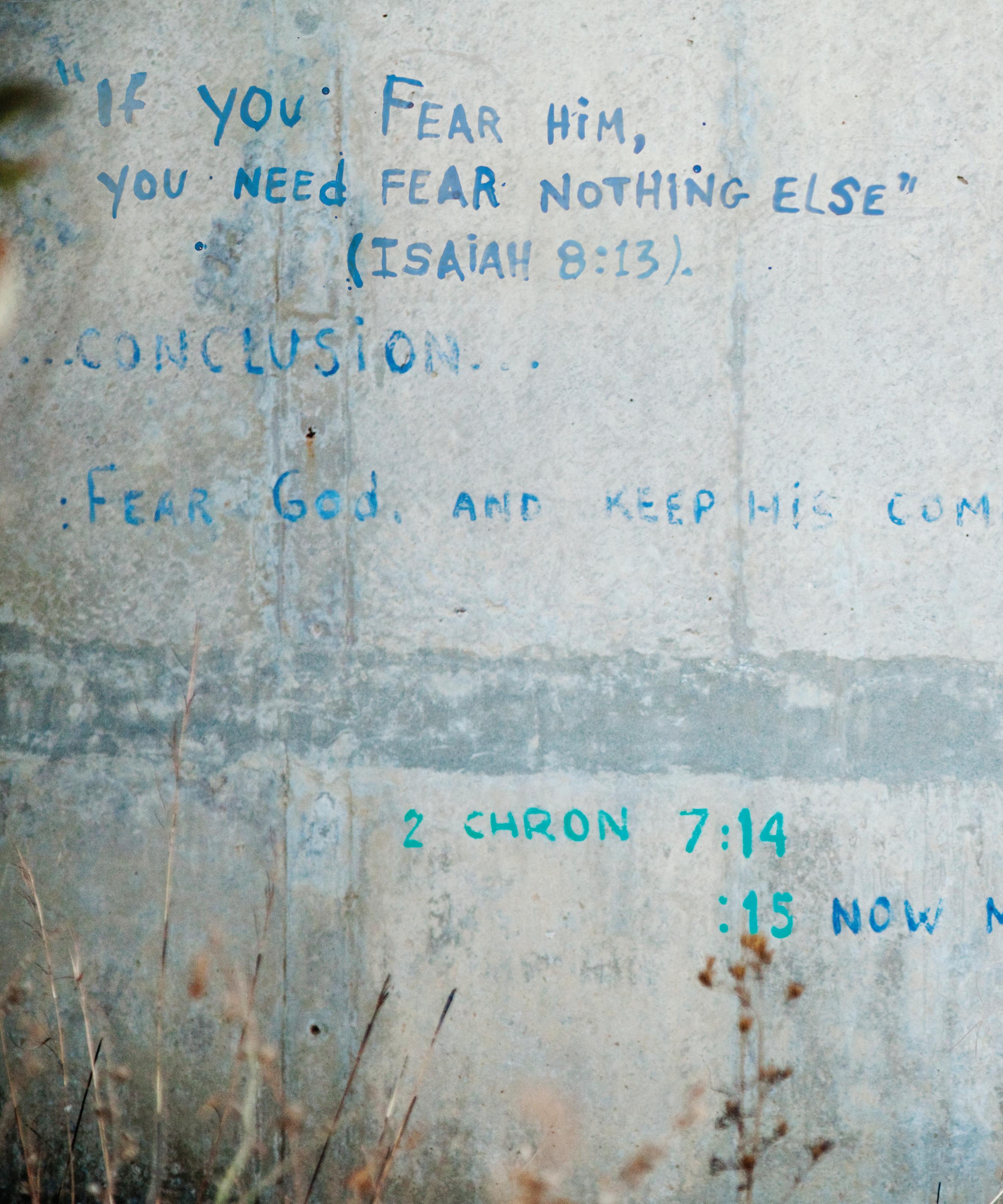
22 CHRISTIAN STANDARD
FIGHTING FEAR with Fear
BY DANIEL SCHANTZ
I was at a church dinner visiting with a highway patrolman, and he said, “Dan, I deal every day with a culture that has no conscience. These guys don’t care who gets hurt. They are not afraid of the police . . . they don’t fear God himself.”
It was a sobering revelation, because fear is vital to civilization, and most normal people have a number of instinctive fears.
Typical Fears
Surveys of the American public show a variety of fears out there—the fear of public speaking, of dentists, of climate change, for example.
Women fear losing their looks and their relationships. One list showed women fear mice almost as much as nuclear war! Perhaps we should be stockpiling

mice instead of missiles.
Males fear physical weakness and not being able to provide for their children. Oh, and they have a deep dread of crying in public. If someone could invent a pill to keep men from crying at weddings and funerals, I would be his first customer.
Young children have a multitude of fears, with the fear of wild animals near the top, which is odd, since kids are not likely to encounter any tigers in suburbia.
My granddaughter was terrified of panthers. When she came to stay with us, I assured her, “There are no panthers in Missouri, Hannah.” But she was not convinced. She slept upstairs with Grandma. My job was
Continued on next page APRIL 2017 23 ©Lightstock
FIGHTING FEAR WITH FEAR
Continued from previous page
to sleep downstairs and make sure that none of the big cats found their way into the house.
Values of Fear
However painful fear may be, it is very useful.
The fear of disease and death spurred creation of modern city sanitation systems and antiseptic procedures for hospitals. The fear of poverty prods many to get a job and start a savings account.
The fear of getting a ticket or killing a child makes me a more careful driver. Fear can even be fun. Alfred Hitchcock made great movies based on his belief that people would rather be scared to death than bored to death.
A Perfect Fear
There is one fear that is actually encouraged in the Scriptures. “The fear of God” is a phrase that appears in a variety of wordings more than 300 times in the Bible. According to the book of Proverbs, this fear is foundational to life itself. It is the starting block in the race of life.
In his autobiography, Gary Burghoff, better known as Radar O’Reilly in the M*A*S*H sitcom, admits he was not the lovable little guy he appeared to be in the show. Rather, he was self-centered, illtempered, difficult, and, consequently, not well-liked by some cast members.
His first marriage failed because he gave everything he had to the show. His second marriage was heading the same direction when his father said to him, “Gary, you need a foundation in your life. You need God.”
When Gary’s father died, Gary dropped to his knees and gave his heart to God. Today he is finally the sweet little guy we saw on the show. The fear of God turned his life around.
How Fear Works
The phrase “the fear of God” is defined several different ways in the Bible, and it can be confusing. Perhaps a better way to understand it is to look at some Bible characters who modeled the fear of God.
The father—When Abraham was commanded by God to sacrifice his son, Isaac, it was a hard, hard request. Did Abraham have misgivings? Any fears? How could he not? For one thing, he risked losing his
son’s love and respect. How do you love a dad who has a knife at your throat? And what about Abraham’s wife, Sarah? After all, this was her son too. How do you tell your wife you have just killed her son?
“Oh, by the way, Sweetheart, I sacrificed our son today, and, hey, what’s for lunch?”
Whatever misgivings Abraham had, he feared God more, and God spared his son because of it.
God asks a lot of hard things of us. For example, he asks us men to be faithful to our wives until death. How is that possible in a world teeming with temptation? Ideally, we should be faithful out of love for our wives, but even the best marriages go through some very difficult times, when affection may become paper-thin for a while. At such times a man’s respect for God and a fear of his sure and certain discipline may be the only thing that can enable him to behave until the marriage improves.
ever done has her fingerprints on it because of her support. Now, in retirement, I am able to give something back to her for the years she gave to me, and it’s a pleasure to do so.
The crook—When Luke describes the crucifixion of Christ, he zooms in on the thief who became a believer in his final moments. This man was probably more than a petty thief. He most likely was a revolutionary, a kind of Robin Hood, who stole from Roman warehouses and sold the goods at discount to those in need. In the process, he may have murdered a Roman guard, hence the capital punishment.
Apparently he was already acquainted with Jesus because he knew that “this man hasn’t done one thing wrong.” When he saw how Jesus returned love to his tormentors, he knew he was looking at a god. He rebuked his fellow thief by saying, “Don’t you even fear God when you are dying?” (Luke 23:40, 41*).
When this repentant thief asked Jesus for a favor, he had to know it was a long shot, in light of the man’s dark past. Imagine how surprised he was when Jesus replied with eight of the most comforting words ever spoken: “Today you will be with me in Paradise” (Luke 23:43).
The noble woman—The godly woman in Proverbs 31 seems almost too good to be true. She clearly is a gifted woman, capable of doing anything she aspires to do, yet she centers her life around her family. Meanwhile, her husband is basking in glory at the city gates.
Some women today would call her a fool for giving up her own dreams to care for her family. After all, husbands are notoriously self-centered and thankless. Children are demanding, draining, even infuriating. They grow up, move away, and forget even to send a Mother’s Day card.
This noble woman kept going because she was working for another employer, her Father in Heaven. Her fear of the Lord was her secret source of energy and solace.
In the end, she received both the applause of Heaven and high praise from her family.
I have been married to a woman like this for 54 years. Every good thing I have
The fear of God opened the gates of Heaven at the last moment, because God honors humility. No matter how wicked a man’s life, there is hope for him when he shows a proper respect for God.
Choosing My Fear
It’s impossible to avoid pain in this life, but I can choose to suffer for a good cause.
Rumors of Christian persecution abound in our daily news. More and more, Christians are looked upon as mentally ill, hateful, even criminal, just as they were in the first century.
I may have to decide whether I am more afraid of jail or judgment day. Whether I am more afraid of the Supreme Court or the Supreme Being.
The secret of surviving this hostile culture is for me to fear the only One who has the power to save me. *Scripture quotations are from The Living Bible Daniel Schantz is a professor emeritus of Central Christian College
24 CHRISTIAN STANDARD
of the Bible, Moberly, Missouri.
It’s impossible to avoid pain in this life, but I can choose to suffer for a good cause.
Out of Control
BY JON KEHRER
We could have learned to trust almost anywhere. But our adventure happened to be in Tunisia.

I remember climbing up onto our roof one night in January, just a few weeks after our family had moved to the Middle East. Cars, with horns blaring, filled the streets below. Windows were adorned with waving flags. People all around were shouting in victory—all because a major political leader in the Arab world had just stepped down.
We didn’t know it at the time, but our move had coincided with the beginning of a popular uprising in Tunisia, a movement that would spread to the rest of the Middle East and become known as the
Arab Spring. Our motivation was not adventure; in fact, our move simply seemed like the next step in what God was asking us to do.
At the time, our move didn’t seem incredibly adventurous or risky. We were convinced that if this was God’s request of us, then our obedience was, to borrow a phrase from the late Dallas Willard, a test of our joyful confidence in God.
That January night, from our rooftop, I watched as people celebrated all around
APRIL 2017 25 Continued on next page
©iStock/Thinkstock
We didn’t know it at the time, but our move had coincided with the beginning of a popular uprising in Tunisia, a movement that would spread to the rest of the Middle East and become known as the Arab Spring.
OUT OF CONTROL
us. I wasn’t afraid; I was excited. This new life of ours was proving to be more adventurous than I expected, and I was eager to see what would happen next.
But I wasn’t prepared for the intensity of the uprising in the country where we had moved, or the bloodshed, or the tear gas, or the government-imposed martial law. Yet even in the face of all that, we found God was present. We certainly were fearful because of political uncertainty at times, but on a deep level, we were convinced God was sovereign and in control.
While we were living in extraordinary times, the reality of our day-to-day lives was often normal, mundane, even ordinary.
I taught English. It was not a glamorous job, and I was not the best English teacher ever to grace the Arab world.

I learned some Arabic, but I never spoke it fluently.

We lived around Muslims who looked, spoke, and thought differently than we did, and we felt those differences on a daily basis.
Seeking Control
In the midst of all this, I found my own fears bubbling to the surface. It was relatively easy to trust God when it came to political realities well beyond my control, but it was much harder to trust him in my daily life. My fears began to materialize into frequent, poorly reasoned prayers intended to talk God into letting me maintain some level of control.
Yet, no matter what the prayer, God’s answer seemed to remain constant: “Trust me.” Indeed, the answer to my fear was faith.
Easier said than done.
Of course, God was trustworthy. When I surrendered myself to his plan, my fears would subside.
However, my desire for control always seemed to creep back in. I would limit how I engaged people so I could control the outcome; I would guard my exposure to those around me so I could avoid danger, or worse, embarrassment. It was hard to continually listen to that voice that
whispered, “Trust me.”
Indeed, my deepest fears were not found in that moment when protesters marched a stone’s throw from our house. Instead, my fear increased in the moment I knew I needed to spend some time with my local friends, but I really just wanted to stay home.
My greater unease wasn’t in those times when I was moving debris out of the road while choking on tear gas. It was
Those were the moments my fears began to paralyze, to threaten to undo me, to drown out any voice of hope and lead me to deep despair.
Questioning Everything
Suddenly, I would find myself questioning everything: Is this worth our time? Why are we living here? Are we sure we even heard God at all?
Yet, somehow, the light of God’s goodness would pierce those dark nights of the soul. I gradually realized these struggles would not go away if we were back in America; it would just be easier to control some of the outcomes. God was using my life away from home to move my heart to a place of joyful confidence in his plan.
As we neared the four-year anniversary of our move overseas, we began to wrestle with a variety of factors that seemed to be pointing us to a life change. We struggled with the risk of moving our family—one that had grown from three to five (with one more on the way)—across the world to begin a new life in a new place. We questioned why God, having acclimated us to this Arab culture, would take us away to do something different. After four years, that once-foreign land felt like home, and we didn’t want to leave. Things were moving out of our control once again.
However, in the end, it was the joyful confidence we learned through our years in the Middle East that allowed us to make the painful decision to leave. It was his whisper of “Trust me” that led us back.
when I sat in a room full of men, knowing they were mocking my beliefs and perspectives on faith in a language I couldn’t understand.
I was far less anxious on the day I thought we might need to evacuate the country than on the day our daughter lay sick in the hospital, and I could do nothing to make her better.
This, then, is our story. Our biggest risk has not been living in the midst of a political revolution; it has been mustering up the courage to live without being in control. Our story may not be extraordinary or dramatic, and it definitely has not been easy. But our journey of learning to joyfully trust God with everything has certainly been the greatest adventure of our lives.
26 CHRISTIAN STANDARD
Continued from previous page
Jon Kehrer is a professor of Old Testament and biblical languages at Ozark Christian College, Joplin, Missouri. He and his family lived in the Middle East for four years, where he taught English.
In Tunisia, it was relatively easy to trust God when it came to political realities well beyond my control, but it was much harder to trust him in my daily life.
Boldness
BY JERRAN JACKSON AND LAREESA JACKSON

“Eighty and six years I have served Him, and never has He done me wrong. How can I ever blaspheme my King who saved me?”1
Around AD 150, Polycarp of Smyrna gave this bold testimony of his faith before he was executed. The official who judged Polycarp’s case tried to convince the old man to swear by Caesar to avoid being burned at the stake. Polycarp could simply have said the words. He could have escaped persecution and a gruesome death. However, Polycarp would not. The reason was faithfulness—Christ had been faithful to Polycarp, and he wanted to be faithful to Christ.

Jesus warned, “If they persecuted me, they will persecute you also” (John 15:20). Paul echoed, “When we were with you, we kept telling you that we would be persecuted” (1 Thessalonians 3:4).
Opposition to your faith will come. How would you like to respond? You can fear it. You can retreat from it. You can give in to it. Or, like Polycarp, you can stand with Christ.
Down through the centuries, believers have responded with holy boldness.2 They have seen opposition as an opportunity to witness about Jesus. While the apostle Paul was in Ephesus, he faced resistance to the gospel, and he responded with enthusiastic evangelism. He wrote, “A great door for effective work has opened to me, and there are many who oppose me (1 Corinthians 16:9).
Opposition and opportunity stood together for Paul, and they often still do.
Here are some accounts of Jesus followers from the past whose examples may inspire you toward holy boldness.
Prepare Yourself
Justin Martyr acquired the title “Martyr” because of his witness to the truth. Writing from Rome in about AD 155,
punishable by death.
With full knowledge of the consequences, Justin wrote, “It is necessary for the friend of the truth, beyond his own existence, even if death is threatened, to say and to do what is right.”3 Later, when Justin was put on trial and required to sacrifice to the Roman gods, he said he would not leave reverence for irreverence.
Rusticus, the prefect, had Justin and his friends flogged and beheaded. They accepted this fate, because they were pursuing a higher goal than staying alive. They had prepared themselves to remain faithful to Christ.
Your faithfulness may not result in a death sentence, but you will be judged by people because of your commitment to Christ. The temptation will be to shrink back, to remain silent, or to distance yourself from Jesus for a while. You need to face this temptation before it hits.
Justin publicly defended the moral and spiritual value of Christianity to his pagan culture. He let it be known he was devoted to Christ, not to the empire’s gods. His faith was viewed as rebellion and was
This was a key to the strength of these early Christians. They foresaw the challenge, anticipated the test, and prepared their spirits. You may not know what form opposition to your faithfulness will take. It might be a government official; it might be another Christian. You may not know what the issue will be: abortion, a tradition in your church, immigration, or an interpretation of Scripture. Nevertheless, you can be sure that your faith and practice as a Christian will be tested.
How do you want to respond?
You can think now about how you
APRIL 2017 27
HOLY Continued on next page
Throughout church history, faithful Christians have risked everything to stand for truth. Their example is a model for us.
An engraving from the 1600s of Polycarp being burned at the stake.
HOLY BOLDNESS
Continued from previous page
want to represent Christ. You can look to the example set by other people of faith, and to how Jesus himself responded when he was challenged. The early Christians prepared themselves for what might come. Then when opposition arose, these believers were ready to “be faithful, even to the point of death” (Revelation 2:10). When they were condemned, their common response was, “Thanks be to God,” because they had won a victory.
Stand on God’s Word
Not every anti-Christian pressure came in the form of death threats. Early in the fourth century, Emperor Constantine sent a message to Athanasius, the young leader of the churches in Egypt and Libya. Constantine told Athanasius to accept everyone who wanted to be part of the church.
Athanasius knew this meant accepting people as Christians who believed Jesus was created, not eternal, and not fully God. Athanasius had studied this issue carefully. He knew what the Bible said, and he knew the implications of just getting along with people in power.
Athanasius saw that the emperor was trying to take control of the church. He told Constantine there could be no communion between the church and those who were fighting against Christ. This began a tug-of-war between Athanasius, a young church leader, and the emperor, who was a hundred times more powerful than our president.
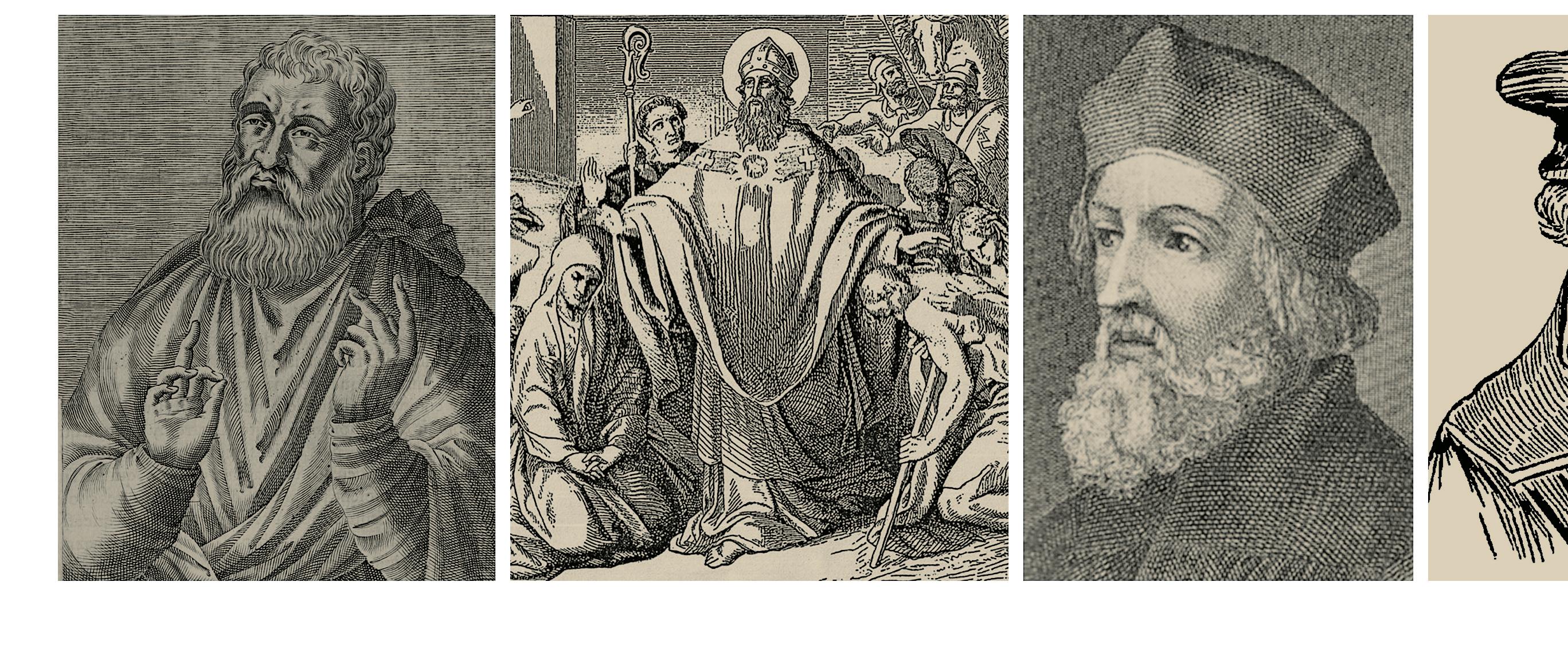
In the following years, Athanasius
spent more time in exile than he did in his home. Still, he stood firm on Scripture. Athanasius held tenaciously to God’s Word and continued to preach the divinity of Christ despite imperial pressure to conform.
Another believer who boldly proclaimed Scripture was Jan Hus, who lived in the 14th century. He became a preacher, but he increasingly realized that church practices
who accept the gift of salvation.
These declarations angered the political and religious leaders. They attacked Hus and demanded that he recant his beliefs. He responded, “I appeal to Jesus Christ, the only judge who is almighty and completely just. In his hands I plead my cause, not on the basis of false witnesses and erring councils, but on truth and justice.”4
Hus was willing to be disproved if the church leaders would show him his error through Scripture, not simply by the weight of their authority. They could not. This humble defiance earned Hus a death sentence; he was to be burned at the stake.
Before the fires were lit, he prayed, “Lord Jesus, it is for thee that I patiently endure this cruel death. I pray thee to have mercy on my enemies.”⁵
Follow the Lord
and teachings were not in line with Scripture. He began speaking out against the sale of indulgences. These were supposedly for the forgiveness of sins, but actually were for the pope’s Crusade expenses.
Hus condemned the Crusades and taught that followers of Christ did not have the right to bear the sword in the name of the church. He also spoke out against the belief that the church is made up of priests and bishops with the pope as the head. Instead, Hus taught that Christ is the head of the church and the body is made up of all
You may not foresee what questions will test you; the issues may not have surfaced yet. This was the case with Martin Luther. This year celebrates five centuries since Luther proposed a discussion that led to a theological, political, and spiritual revolution. Luther had no intention of upsetting the applecart; he just wanted to remove a few rotten apples.
Like Hus, Luther wanted to get rid of the idea that people could purchase forgiveness. As he contradicted this practice, Luther found it was only the tip of the iceberg. The Roman Catholic Church was following a whole host of unbiblical beliefs and practices.
28 CHRISTIAN STANDARD
Jan Hus taught that Christ is the head of the church and the body is made up of all who accept the gift of salvation. These declarations angered the political and religious leaders.
Jan Hus
Athanasius being persecuted. Justin Martyr
Luther found himself on a journey that included opposition by government leaders, opposition by church leaders, death threats, being tried and condemned by the emperor, being kidnapped, translating the Bible, leading a movement, watching it fail, enduring depression, getting married, counseling kings, and searching for more truth. Throughout, Luther attempted to follow Jesus.
No one does this perfectly, but going where God leads is part of holy boldness.
In the 18th and 19th centuries, William Carey, Søren Kierkegaard, and many others traveled this same path. Carey saw a world in need and listened to Christ’s call to evangelize the nations. Following the Lord, Carey blazed a trail by promoting world missions and by becoming a missionary to India.

Church leaders opposed him. Government-run trading companies opposed him. Native people opposed him. Nevertheless, Carey followed the Lord and ignited the modern missionary movement.
Kierkegaard found lifeless churches and empty-hearted church members. Faith was merely accepting logical propositions. The church was simply a tool of the culture. The Holy Spirit was completely absent and unwelcome in Christendom.
Kierkegaard, along with men like Philipp Jakob Spener, John Wesley, and Jonathan Edwards preached, taught, and lived a Christianity in which the Holy Spirit was active. These people endured
opposition from church leaders and church members who preferred the status quo. Following the Lord meant doing things differently, and many church regulars clashed with them.
Not everything these men believed and taught was biblical, but they boldly sought the holiness of Christ’s body and endured opposition because of it. Yet God’s Spirit spread from these men’s efforts and sparked revival.
Also in the 19th century, Alexander Campbell and Barton W. Stone met with ridicule and vitriol for trying to restore New Testament Christianity. Their rejection of human creeds and divisive denominational practices pitted these men against every known Christian group.
Campbell, Stone, and others attempted to follow the Lord without man-made traditions. This journey led them to some radical conclusions about how to interpret Scripture, how people come into God’s kingdom, and how the church is organized. They endured attacks, yet they held tightly to the Lord and his Word. They determined to trust Jesus and the apostles over church leaders.
Anticipate Trouble
The examples of these believers give us guidance on how to face opposition. “In this world you will have trouble,” Jesus warned (John 16:33). Those who expect pressure can anticipate and prepare for it.
Learning about the devotion of followers of Jesus down through history can en-
courage you. A regular practice of prayer can strengthen you. Your own Scripture reading and careful study will help you stand on God’s Word rather than drift with the cultural tide. Jesus promised, “When you are brought before synagogues, rulers and authorities, do not worry about how you will defend yourselves or what you will say, for the Holy Spirit will teach you at that time what you should say” (Luke 12:11, 12).
Before you face opposition, though, you can prepare to remain faithful to the Lord. You can pursue a holy boldness that is willing to trust Jesus even when you are under pressure.
1“Letter to the Smyrnaeans on the Martyrdom of Polycarp,” The Apostolic Fathers, section 9, author’s translation.
2Many women also have demonstrated holy boldness throughout the centuries. See “The Martyrdom of Perpetua and Felicitas,” trans. R. E. Wallis, accessed January 6, 2017, www.ccel.org/ccel/schaff/anf03.vi.vi.i.html. See also Eusebius’s Book 8 in Paul L. Maier, Eusebius, The Church History: A New Translation with Commentary (Grand Rapids: Kregel Publications, 1999), 289–315.
3Justin Martyr, First Apology, section 2, author’s translation.
4Mark Galli and Ted Olsen, eds., 131 Christians Everyone Should Know (Nashville: Holman Reference, 2000), Kindle Edition, 371.
5Galli and Olsen, 131 Christians Everyone Should Know, 371.
Jerran Jackson and Lareesa Jackson are a father-daughter writing team who love to talk with people about what God is doing in our world and in our lives. Jerran serves as minister with Clarksburg (Indiana) Christian Church.
APRIL 2017 29
Martin Luther
All images courtesy of Wikimedia Commons
William Carey John Wesley
‘Faith Up’ to Your Fears
COMPILED BY DOUG REDFORD
Feeling fearful these days? That’s not unusual. Throughout the Bible we find stories of God’s people who were afraid. And again and again, God, one of his angels, or Jesus himself told the frightened follower, “Fear not.”
Here we’ve compiled a list of these fear-chasing challenges. You may want to look up some of these verses to see the whole story surrounding them. Or you may choose a couple to keep by your desk or on your mirror or in your pocket. Maybe memorizing one or two of these will remind you that God’s in control, no matter what fearful situation you’re facing.
To Abram: “Do not be afraid, Abram. I am your shield, your very great reward” (Genesis 15:1).
To Hagar: “What is the matter, Hagar? Do not be afraid; God has heard the boy [Ishmael] crying as he lies there” (Genesis 21:17).
To Jacob: “I am God, the God of your father. . . . Do not be afraid to go down to Egypt, for I will make you into a great nation there” (Genesis 46:3).
To Moses: “Do not be afraid of him [Og, king of Bashan], for I have delivered him into your hands, along with his whole army and his land” (Numbers 21:34; cf. Deuteronomy 3:2).
To Joshua: “Be strong and courageous. Do not be afraid or terrified because of them [inhabitants of Canaan], for the Lord your God goes with you; he will never leave you nor forsake you” (Deuteronomy 31:6; cf. 31:7, 8, 23; Joshua 1:6, 7).
“Have I not commanded you? Be strong and courageous. Do not be afraid; do not be discouraged, for the Lord your God will
be with you wherever you go” (Joshua 1:9; cf. 8:1; 10:8; 11:6).
To Gideon: “Peace! Do not be afraid. You are not going to die” (Judges 6:23).
To Hezekiah: “Do not be afraid of what you have heard—those words with which the underlings of the king of Assyria have blasphemed me” (2 Kings 19:6).
To Asa: “But as for you, be strong and do not give up, for your work will be rewarded” (2 Chronicles 15:7).
To Jehoshaphat: “Do not be afraid or discouraged because of this vast army. For the battle is not yours, but God’s. . . . Do not be afraid; do not be discouraged” (2 Chronicles 20:15, 17).
To Isaiah: “Do not call conspiracy everything this people calls a conspiracy; do

30 CHRISTIAN STANDARD
“Do not be afraid” is a thread through all of Scripture.
not fear what they fear, and do not dread it” (Isaiah 8:12).
To Jeremiah: “Do not be afraid of them [those to whom I send you], for I am with you and will rescue you” (Jeremiah 1:8).
To Ezekiel: “And you, son of man, do not be afraid of them or their words. Do not be afraid. . . . Do not be afraid of what they say or be terrified by them, though they are a rebellious people” (Ezekiel 2:6; cf. 3:9).
To Daniel: “Do not be afraid, you who are highly esteemed. . . . Peace! Be strong now; be strong” (Daniel 10:19).
To those rebuilding the temple: “But now be strong, Zerubbabel. . . . Be strong, Joshua son of Jozadak, the high priest.
Be strong, all you people of the land . . . and work. For I am with you” (Haggai 2:4).
“My Spirit remains among you. Do not fear” (Haggai 2:5).
“Do not be afraid, but let your [Judah and Israel’s] hands be strong” (Zechariah 8:13; cf. v. 15).
To Joseph: “Joseph, son of David, do not be afraid to take Mary home as your wife, because what is conceived in her is from the Holy Spirit” (Matthew 1:20).
To Zechariah: “Do not be afraid, Zechariah; your prayer has been heard. Your wife Elizabeth will bear you a son, and you are to call him John” (Luke 1:13).
To Mary: “Do not be afraid, Mary; you have found favor with God” (Luke 1:30).
To the shepherds: “Do not be afraid. I bring you good news that will cause great joy for all the people” (Luke 2:10).
To Simon Peter: “Don’t be afraid; from now on you will fish for people” (Luke 5:10).
To the disciples: “You of little faith, why are you so afraid?” (Matthew 8:26; cf. Mark 4:40).
“Take courage! It is I. Don’t be afraid” (Matthew 14:27; cf. Mark 6:50; John 6:20).
To the friends of the paralytic: “Take heart, son; your sins are forgiven” (Matthew 9:2).
To a sick woman: “Take heart, daughter, . . . your faith has healed you” (Matthew 9:22).
To Jairus: “Don’t be afraid; just believe” (Mark 5:36; cf. Luke 8:50).
To Peter, James, and John at the transfiguration: “Get up. . . . “Don’t be afraid” (Matthew 17:7).

To the women on resurrection morning: “Do not be afraid, for I know that you are looking for Jesus, who was crucified. He is not here; he has risen, just as he said. Come and see the place where he lay” (Matthew 28:5, 6).
“Do not be afraid. Go and tell my brothers to go to Galilee; there they will see me” (Matthew 28:10).
To Paul: “Take courage! As you have testified about me in Jerusalem, so you must also testify in Rome” (Acts 23:11).
(Paul speaking) “Last night an angel of the God to whom I belong and whom I serve stood beside me and said, ‘Do not be afraid, Paul’” (Acts 27:23, 24).
To John (in exile): “Do not be afraid. I am the First and the Last” (Revelation 1:17).
To all servants of the Lord: “So do not fear, for I am with you; do not be dismayed, for I am your God. I will strengthen you and help you; I will uphold you with my righteous right hand” (Isaiah 41:10).
“Wait for the Lord; be strong and take heart and wait for the Lord” (Psalm 27:14).
“Be strong and take heart, all you who hope in the Lord” (Psalm 31:24).
“Cast your cares on the Lord and he will sustain you; he will never let the righteous be shaken” (Psalm 55:22).
“So do not be afraid of them [those who oppose you], for there is nothing concealed that will not be disclosed, or hidden that will not be made known” (Matthew 10:26).
“Do not be afraid of those who kill the body but cannot kill the soul. Rather, be afraid of the One who can destroy both soul and body in hell” (Matthew 10:28; cf. Luke 12:4).
“So don’t be afraid; you are worth more than many sparrows” (Matthew 10:31; cf. Luke 12:7).
“Do not be afraid, little flock, for your Father has been pleased to give you the kingdom” (Luke 12:32).
“Peace I leave with you; my peace I give you. I do not give to you as the world gives. Do not let your hearts be troubled and do not be afraid” (John 14:27).
“I have told you these things, so that in me you may have peace. In this world you will have trouble. But take heart! I have overcome the world” (John 16:33).
“Be on your guard; stand firm in the faith; be courageous; be strong” (1 Corinthians 16:13).
“Finally, be strong in the Lord and in his mighty power” (Ephesians 6:10).
“Do not be anxious about anything, but in every situation, by prayer and petition, with thanksgiving, present your requests to God” (Philippians 4:6).
“But even if you should suffer for what is right, you are blessed. ‘Do not fear their threats; do not be frightened’” (1 Peter 3:14).
“Cast all your anxiety on him because he cares for you” (1 Peter 5:7).
“Do not be afraid of what you are about to suffer. . . . Be faithful, even to the point of death, and I will give you life as your victor’s crown” (Revelation 2:10).
APRIL 2017 31
Doug Redford serves as minister with Highview Christian Church, Cincinnati, Ohio.
©Lightstock
“Do not be afraid; keep on speaking, do not be silent”
(Acts 18:9).
The Riskiest Move
Five Christian leaders tell what God did when they took a surprising step of faith.

32 CHRISTIAN STANDARD ©Lightstock
I’ve Made for God I Had More to Lose Than Ever
BY VINCE ANTONUCCI
I’ve heard people say faith in a big God allows you to take big risks. I’d say that doesn’t go far enough. Faith doesn’t just allow you to take risks; faith requires that you take risks. In fact, faith IS risk.
When I became a Christian, I had a full scholarship to a top law school. I loved law school. The average first-year salary coming out of my law school was $80,000. While attending there, I felt God calling me into the ministry. Though it seemed like a huge risk, I did it. I transferred to a seminary, where I paid about $15,000 a year to study for a job where the average first-year salary was $25,000.
After seminary, I was offered a job at a megachurch at a salary of about $40,000. A church of 80 people also offered me a job, but they couldn’t afford to pay me anything. That seemed like a God-size risk, so I had to take it.

That church I chose to serve started to grow, and
a couple of years later they finally said, “We can pay you now.” So I left. I moved to Virginia Beach to start a new church. Again, it was a church that couldn’t pay me. The church grew at an amazing rate; we saw a thousand people come to Christ in 11 years. Things were awesome. I was even given a salary, and then a raise. So I left.
I moved to Nevada and started a church in the middle of Las Vegas. That was the riskiest move I’ve made for God. I had way more to lose than I ever had before.
My family loved Virginia Beach and wanted to live there forever, loved our church and didn’t want to leave. Raising kids in Sin City seemed less than ideal.
There was no assurance that planting a church
APRIL 2017 33 Continued on next page
The Riskiest Move I’ve Made for God
I HAD MORE TO LOSE THAN EVER
just off the Vegas Strip would work. In fact, a pastor in Las Vegas told me I was “committing career suicide.” Fortunately, I didn’t have a career. I had a calling, and the calling was to start a church in the middle of Sin City.
As I recall the decisions I’ve made in my life, and as I’ve listened to others talk about their decisions, I’ve concluded that fear is the reason we don’t take risks. We’re afraid of regrets. If we take a risk, it may not go so well. We might regret what we’ve done. Those fears are legitimate. If we take risks, we may
have regrets. But here’s what I’m sure of: We will have greater regrets if we don’t take the risks. Our regrets of inaction are more painful than our regrets of action.
So I’d encourage you, if you think God is calling you to something, take the risk. You’ll be glad you did. You have a big God. Faith in a big God requires you to take big risks.
Kansas? You Want Us to Go to Kansas?
BY LAURIE MONTAGUE
As I sat on the front row ready to take my place as the keynote speaker for the women’s retreat, the director concluded her introduction with these words, “And now, here’s our fearless leader.” Of all the things that could be said of me! I would never describe myself as a “fearless leader.”
In fact, at several points in my life, a more accurate description would have included the words “scared silly!” Yet, like many others, I’ve learned that making risky moves for God often requires putting aside fear and stepping out in faith.
It’s always been interesting to me how many of the faithful struggled with fear. Again and again throughout the Bible, God’s faithful heroes—Moses, Joshua, Mary, Joseph, and many others—have been instructed not to be afraid when making a risky move for God.
For my husband, Greg, and me, our assignment pales in comparison to delivering the Israelites from Egypt, claiming the promised land, or safely bringing the Messiah into our world. But for us, it was a
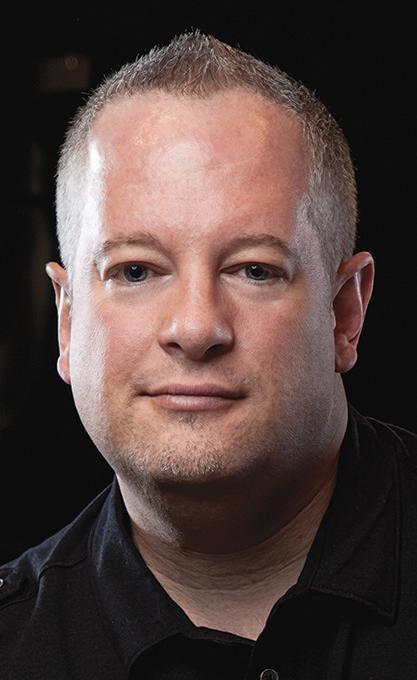

risky move when God called us to Kansas to start a new church.
Sacred Echo
After graduating from Cincinnati (Ohio) Christian University, we settled into ministry at a growing church in Indianapolis, Indiana, where we both had meaningful ministry positions, good
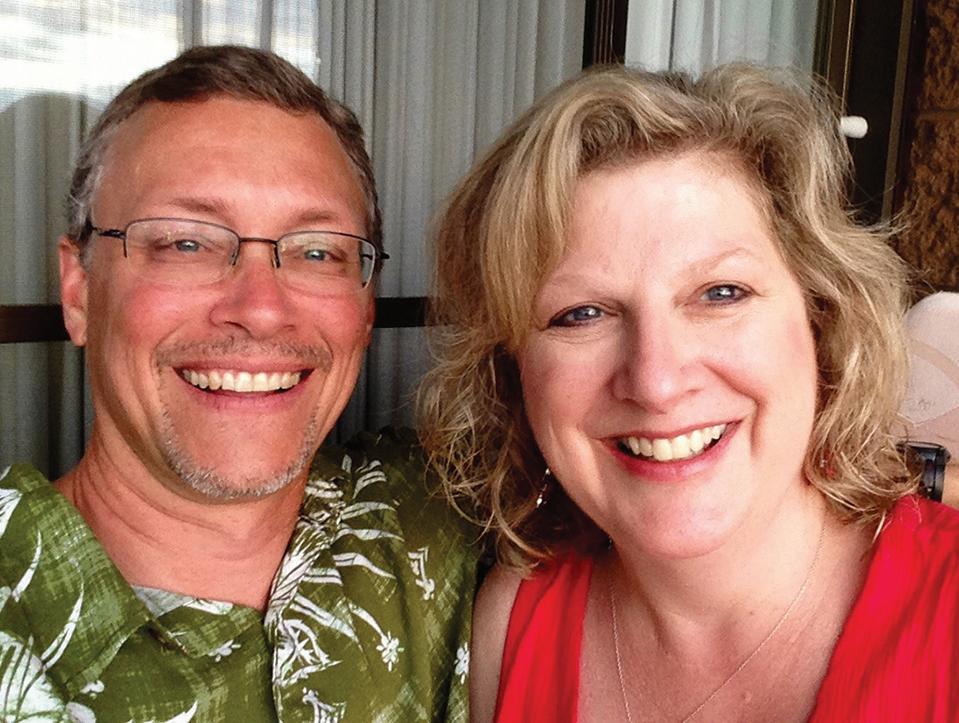
friends, and family nearby. It was a perfect blend for a young couple starting out in marriage and ministry. But God had different plans for us. In the late 1980s, we began to feel restless. God seemed to be calling us to start a new church. Like a sacred echo, this idea showed up again and again, confirming that God indeed wanted us to listen.
So, in 1989, we heard him when the Christian Evangelizing Association of Kansas asked us to consider coming to Johnson County, in the suburbs of Kansas City, to plant a new church.
To be honest, my first response was, “Kansas?” Like most, I’d seen Kansas as the state you fly over or drive through on your way to somewhere else. I imagined the endless wheat fields, prairies that are flatter than a pancake, and the
34 CHRISTIAN STANDARD
Vince Antonucci is an author and the pastor of Verve Church, Las Vegas, Nevada.
Continued from previous page
Vince Antonucci
Greg and Laurie Montague
ongoing search for Dorothy and Toto. It felt a little risky.
In addition, I also felt the risk of what we were leaving behind. In Indianapolis, we were serving with a full staff in a growing church where we were known and loved. Yet, God seemed to be leading us toward an unestablished church with no staff where we knew no one. It felt like a
risky move.
But the more we prayed, the more we felt a strong sense of God’s peace, presence, and provision. I distinctly remember the Lord assuring me of his presence as I prayed one day. It was as if he said, “Will I not go with you? Will I not give you everything you need? Will you trust me? Will you follow?”
Immediately, my mind was flooded with verses of Scripture, songs of faithfulness, and reminders of his presence and provision in my life. And as his Word washed over me, it became easier to put aside the fear and step out in faith.
We made the risky move to Kansas and amazingly, God went with us! In fact, he had already been there—preparing the way and providing financial resources, gifted servants, and faithful friends. On April 8, 1990, SouthWoods Christian Church was successfully planted in Overland Park, Kansas. Nearly 27 years later, Greg and I continue to serve God and people there, leading them to become fully devoted followers of Jesus.
It hasn’t always been easy. But God’s been faithful, and we’ve done our best to be faithful too. Recently, an old friend from our college days remarked, “You and Greg were planting churches before church planting was cool!”
I smiled, grateful that God called us not to be cool leaders, or even fearless leaders, but to be faithful leaders planting and growing his church in the beautiful state of Kansas.
I Still Remember His Faithfulness 20 Years Ago
BY GREG LEE
My riskiest move ever? It was 20 years ago. God was faithful, and that step established a way of life and a way of leading that has stayed with me ever since.
I was 21 years old, six months from getting married, and five months from graduation at Lincoln Christian College. I was from a small town and liked it. I wanted
to preach (anything but youth ministry)! I wanted a full-time job to support my new family.
Then I met John Wasem.
John had just started a new church, and it was experiencing unpredicted growth— in Chicagoland. The church needed more help—in student ministry. They could of-

fer only $9,000—for a part-time position. He offered me that job and, of course, I turned it down.
It was logical to say no, but the truth is I sensed this opportunity was from God. I loved the vitality and outward focus of
APRIL 2017 35
Laurie Montague serves as director of adult ministries at SouthWoods Christian Church (Overland Park, Kansas).
Continued on next page
©Lightstock
The Riskiest Move I’ve Made for God
I STILL REMEMBER HIS FAITHFULNESS 20 YEARS AGO
Continued from previous page
brand-new churches like this. I really wanted (and needed) to work under a seasoned leader like John. I care about lost people deeply, and Chicagoland had unlimited opportunity for impact.
Then, a few weeks later, John asked me out to lunch again. This time he asked if I would come work full-time, but only get paid part-time! It was a crazy request. I responded with an unreasonable answer: “Yes!”
I knew God was in this, but it was hard to explain how. It wasn’t the “big church” job some people around me were hoping I would land. I would humbly need to ask friends and family for financial support just to get by at this new church—and then hope the church would grow and be able to support me when that ended. And it would mean my soon-to-be wife couldn’t finish her college degree.
But that single step of faith—and God’s faithfulness to us—set the course for how to live ever since. We never again wanted to construct our lives without major elements that require trust in God. The list below represents steps of faith God has led us to since this risk. And more importantly, it represents his faithfulness.
Steps of Faith
With John Wasem, we declared that our church would not move into a building of our own until we had started another new church. That’s crazy when you are setting up and tearing down for church each weekend—but it was also right for the kingdom.

That step of faith created a culture that has resulted in Suncrest—the church I now serve—starting more than 30 churches, and those churches starting 150 more!
Jenny and I tithed from the beginning (thanks Mom and Dad!), but once the church could pay me a full salary,
we started giving at least 20 percent of our income to kingdom work. It didn’t add up in our budget, but God was faithful.
Years later, our church took the same step of faith— giving 20 percent of our offerings away instead of 10 percent. Our team embraced leaner spending so we could start new churches and live out a deep commitment to the impoverished of our region. In the shift, God has blessed our church with its fastest season of growth ever.
We risked becoming a multisite church before most anyone else was doing it. Frankly, that one didn’t work out. After lots of years and money, one of the toughest decisions we made was to go back to being one campus. It meant disappointing people and admitting we may have taken a risk where we got ahead of God. I think it is healthy to admit it . . . and then keep taking risks.

Six years ago, I knew our church had lots of unchurched people who had not defined their faith in baptism. Our elders prayed, and God led us to have a service asking people to make the decision on the spot—in their clothes and all, when they had not planned on it. We laid it on the line, and I feared huge embarrassment if no one responded, especially since I jumped in the baptistery first.
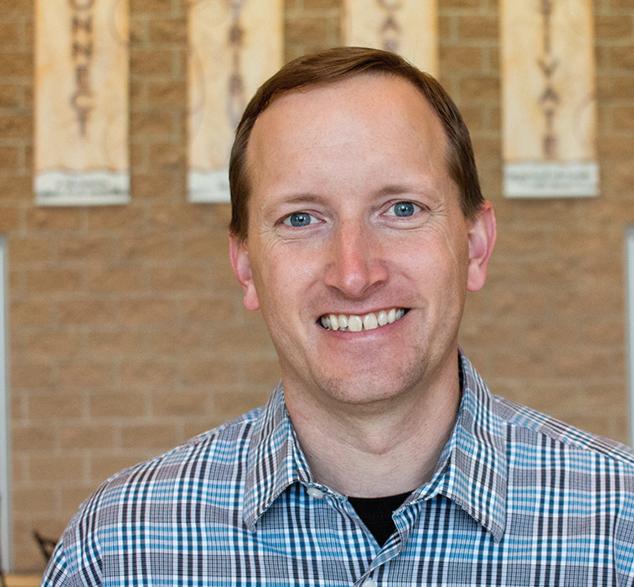
That day, God moved like never before at our church, and nearly 100 people came up to experience death, burial, and resurrection in Jesus. That day transformed our church to be bolder in asking people to define their new faith in baptism. Since then more than 550 people have taken the same step.
A member of our staff recently told me, “You aren’t a risk-taker by nature. But you do trust God.” The first part is definitely true. I only hope the second part is.
I have seasons where I hesitate and retreat to trusting myself. Nothing supernatural happens. Then I remember God’s faithfulness of 20 years ago and think it’s time to trust . . . to risk . . . again.
36 CHRISTIAN STANDARD
Greg Lee serves as lead pastor with Suncrest Christian Church, St. John, Indiana.
©Lightstock
Greg Lee
My List of Possibilities Is Pretty Short
BY RUSTY RUSSELL
I’m living proof God can use ordinary people to accomplish extraordinary things. Why God chose me to lead a church of 1,200 people in Southwest Florida is a mystery to me. I’m not a risk-taker. I like routine. I’m not a type-A personality. On the DISC profile, “D” doesn’t show up for me. When I go to the pool, I don’t dive in. I’m a toe-in-the-water guy. I ease in.
My friends think I’m boring, but at least I’m predictable.
So trying to determine “the riskiest move I made for God” isn’t that difficult because the list of possibilities is pretty short. The one that leaps out is the decision I made in 2010 to leave my associate position at Southeast Christian Church in Louisville, Kentucky, and take the position of lead pastor at New Day Christian Church in Port Charlotte, Florida.
I moved with my wife and four children (ages 6 to 15 at the time) a thousand miles away from home. Though I had briefly lived away from Louisville in my young adult years, we had spent almost 20 wonderful years at Southeast, and my children had never lived outside the Louisville area.
It was risky, and there were reasons to fear. What if my kids hate it? What if they hate me for this decision? What if I hate it? What if I bomb? I’m following a great young storyteller—Jamie Snyder—who preaches without notes. My approach is more “scholarly” (code for boring), and I use notes. Jamie brought a lot of energy and a lot of young people during his four years at New Day. I’m in my forties. What if all the young people leave?
We moved anyway.
We had some rocky days in the first year, but God has blessed our decision. Over a six-year period, the church has grown from 600 to 1,200 people, we’ve baptized nearly
500, and God has brought financial health to a church that was still suffering from a 10-year-old financial crisis.
And my family has adjusted well: My kids love the church and consider Florida “home,” my oldest married a wonderful girl he met at our church, and they’re all still speaking to me. And I love my job!
I’m glad they didn’t ask me to write this article after my first year at New Day. I re-
who kept saying, “Rusty, you’re doing the right thing. You just keep preaching God’s Word and loving God’s people, and God is going to turn this thing around.” Sure enough, God did.
Three Rules
As I reflect on the riskiest move I’ve made for God, I would challenge young leaders to adopt three rules, that by God’s grace, I’ve tried to implement in my life when it comes to taking risks:
1. I will make no decision out of fear. “For God did not give us a spirit of fear . . . ” (2 Timothy 1:7, author’s paraphrase) If that’s true, then fear is ungodly. There are exceptions, of course. It’s not wrong to stop at the stop sign in part because you fear getting in an accident. And it’s not wrong to fear the accounting we will someday give before God.
But I know it’s ungodly to make a decision based on my fear of failure, fear of fallout, fear of embarrassment, and so forth. So when it comes to the moment of decision, faith—not fear—will be my motivator.
member attending the North American Christian Convention in 2011, one year after we moved. I knew everyone would be asking how things were going. I dreaded the questions and almost didn’t go. But because I so desperately needed the encouragement, I was willing to face my friends and tell the truth.
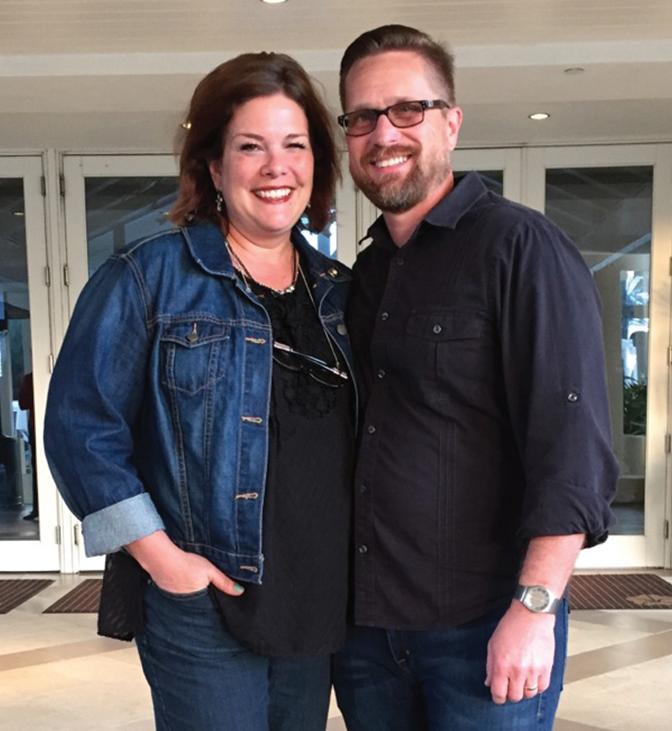
“How’s it going, you ask? Well, let’s see: Attendance is down. Offerings are down. We had to fire two employees and a volunteer who slammed the door on me when he walked out. . . . It’s going great!”
Thankfully I had good friends who encouraged me. And I had a wonderful dad
2. I will take calculated risks. Jesus said, “No man builds a tower without considering the cost” (Luke 14:28, author’s paraphrase). Maybe Jesus can use my toein-the-water personality if I’m willing to plod forward after calculating the cost.
I had sensed for years that God was nudging me back to the preaching ministry, as difficult as it would be to move. So I prayed, counseled with close friends, and consulted my wife. When the decision got closer, I included my children, asked them to pray, and considered their feelings. Then I fasted and prayed. I made charts on a legal pad of the positives and negatives
APRIL 2017 37
Continued on next page
Kellie and Rusty Russell
The Riskiest Move I’ve Made for God
MY LIST OF POSSIBILITIES IS PRETTY SHORT
Continued from previous page
of each possible choice.
Because of that diligence, I believe I made a wise decision. We moved to a place that was healthy for my family, was in line with my giftedness, needed my style of leadership, and was primed to do great things for the kingdom of God. And it doesn’t hurt that it’s a place our friends and family love to visit in the winter!


3. I will find a way to succeed. “The
way of the sluggard is blocked with thorns, but the path of the upright is a highway” (Proverbs 15:19). Plodders are often surprisingly successful for one reason: they’re determined. No matter how difficult the situation, they take one more step. They refuse to quit. They refuse to chase fantasies and bail out when life gets tough, only to brag about taking “yet another risk.”
I read often about great leaders in the
business world who are wired a lot like me, and it encourages me. Maybe you don’t have to be a “type-A” guy to be successful. Maybe you just have to be loyal, stubborn, patient, and willing to work hard.
If you’re wired like me and think you’re risk-averse, take heart. God can still use you!
Me, a Missionary?
BY TAMARA MUNROE
Home is where my family is. My mom is my rock, my dad is my hero, and my two brothers are my heart. It has always been that way for me.
My family is everything. They are a big part of why it was so hard for me to pack up all of my things, board a plane, and fly an ocean away to Spain to embark on a new adventure.
But that’s exactly what I did, and it’s the riskiest move I’ve made thus far.
In 2016, I moved to Salamanca, Spain, to join the leadership team of En Vivo, Globalscope’s international campus ministry. En Vivo is a ministry that seeks to point college students to Jesus; and week after week, I have seen it do just that. In a cultural context where it is both uncommon and unlikely, I am seeing college students at En Vivo come to know Jesus intimately and choose to follow him. It is a privilege to support this community and to help encourage and equip these students.
And I cannot believe I almost said no to all of it.
In fact, soon after I said yes, I came up with a list of some really great reasons I should say no. I hardly knew Spanish; I hardly knew anything about Spain or Spanish culture; I had zero experience in campus ministry; and I had about 1,000 reasons why I didn’t fit the description of a missionary.
As it turns out though, those weren’t reasons to say no, they were just reasons I was afraid.
I was afraid because I felt inadequate, and it was possible I would fail. I was afraid because this context was unfamiliar, and I didn’t yet know what exactly I didn’t know. I was afraid because this adventure had the potential to expose my weaknesses rather than spotlight my strengths, and I didn’t know if my pride could handle it. I was afraid because I knew this would be hard and maybe even lonely, and my rock, my hero, and my heart would be an ocean away while I figured it all out.
I was afraid because taking a risk is scary.
Bold Steps
A risky move doesn’t always involve literally picking up and moving, like it did for me, but it does always involve stepping out and being uncharacteristically bold. It always poses an inconvenience on our sense of security and disrupts our concept of normal. It always pushes us beyond our limits and calls us to make sacrifices. It always requires us to get uncomfortable. It always forces us to admit our fears and then say yes anyway.
It demands we practice what we preach in our churches and actually have some faith in God.
As worried and afraid as I was, I saw moving to Spain as an amazing opportunity for me to love people and to trust God, and I was willing to take whatever risks that required. I felt compelled to get involved in the mission of Globalscope, and I believed that loving students was a worthwhile investment of my time, energy, effort, treasure, and talent.
So I took the risk, and so far, it has been a tough and trying, yet rewarding, adventure. It has brought me to a place well beyond my comfort zone and past my personal limitations, and it has allowed my faith and trust in God to continue to be cultivated in unfathomable ways.
This journey has reminded me of what God can accomplish both through us and in us when we are willing. It has served to remind me that, though it may not come naturally, I was made to take risks.
All Christ followers are called to take risks.
38 CHRISTIAN STANDARD
Tamara Munroe serves as campus minister with Globalscope Salamanca in Salamanca, Spain.
Rusty Russell serves as lead pastor with New Day Christian Church, Port Charlotte, Florida.
Tamara Munroe

Our challenge to be experts at discernment
DO NOT CALL Conspiracy EVERYTHING This People Calls a CONSPIRACY
BY T.R. ROBERTSON
I saw a comedy skit in 1970 that blew my adolescent mind. Two news producers were tasked with faking the Apollo 11 moon landing. They argued over whether the fuzzy picture made the story more believable or less. They laughed about other big events they’d faked over the years.
I knew it was only comedy, but it triggered a strong enough hiccup in my adolescent worldview that it stayed with me all these years. What if?
A 2015 CBS/Vanity Fair poll found 14 percent of Americans believe the moon landings were staged.
That same poll found 70 percent of Americans believe Lee Harvey Oswald did not act alone; 24 percent believe 9/11 was orchestrated by someone other than Islamic terrorists; and 20 percent are still convinced Barack Obama was born in Africa.
I have no polling data on the percentage of Christians who subscribe to conspiracy theories. Anecdotal data, however, suggests it’s not an insignificant number. My social media feeds lead me to think many Christians believe at least some conspiracy theories and are not shy
about saying so.
This troubles me. Shouldn’t Christians, who should have a better grasp on truth than anyone, be experts at discernment?
Take Every Thought Captive
Paul says Christians will “demolish arguments and every pretension that sets itself up against the knowledge of God, and
ter at discerning truth than the general public.
The underlying factor behind all conspiracy theories is the worldview of the people who believe them. An individual’s political, philosophical, and religious convictions tend to push them toward belief or doubt before any evidence is available. While they think they’re searching for truth, they’re actually just looking for whatever explanation best confirms their bias. They’re searching for an acceptable answer to that “what if?” question.
we take captive every thought to make it obedient to Christ” (2 Corinthians 10:5).
Paul is describing an intentional, critical approach to examining the notions and ideas we consume. This requires applying principles of logic to judge each case against verifiable facts and against God’s truth.
Sadly, most Christians aren’t much bet-
Rob Brotherton, author of the book Suspicious Minds, says, “The prototypical conspiracy theory is an unanswered question; it assumes nothing is as it seems; it portrays the conspirators as preternaturally competent; and as unusually evil; it is founded on anomaly hunting; and it is ultimately irrefutable.”
That definition certainly describes the complicated narratives of fringe theorists, but it also fits the burgeoning category of mainstream conspiracy speculations.
Hillary Clinton dragged conspiracy theories into the mainstream when, as first lady, she spoke of a “vast right wing
40 CHRISTIAN STANDARD
One person’s “ridiculous” conspiracy theory is another person’s lifeline to understanding their world.
conspiracy” against the Clintons. During the 2016 election, some of her opponents claimed she was part of a conspiracy of the global elite, aiming to advance a worldwide agenda.
One person’s “ridiculous” conspiracy theory is another person’s lifeline to understanding their world.

In the aftermath of the 2016 presiden-
tial election, many believed reports of the Russian government’s conspiracy to interfere in the American electoral process. Polls showed just as many Americans believed this story was part of a conspiracy by the Democrats aimed at discrediting the results.
It’s likely very few adherents to those opposing conspiracy theories actually
dug any deeper to verify or disprove the conflicting scenarios. Social media studies have shown most people read only the headline of a news story, at most a paragraph or two. They see a headline and immediately share it with their friends without reading any further.
APRIL 2017 41 Continued on next page
Photo courtesy of Wikimedia Commons
Astronaut Buzz Aldrin, lunar module pilot, stands on the surface of the moon near the leg of the lunar module, Eagle, during the Apollo 11 moonwalk on July 21, 1969. Astronaut Neil Armstrong, mission commander, took this photograph with a 70mm lunar surface camera. A poll in 2015 found that 14 percent of Americans believe the moon landings were staged.
DO NOT CALL CONSPIRACY EVERYTHING THIS PEOPLE CALLS A CONSPIRACY
Continued from previous page
It’s easy to think conspiracy theories are something “those people” hold onto. But according to Brotherton, we’re all susceptible to conspiracy theories. Research shows nearly everyone has some feelings of paranoia, alienation, and powerlessness—three of the key indicators of a person prone to embrace conspiracy theories.
We live in an era when terrorism, hightech surveillance, and bipolar politics dominate the daily news. It’s not surprising that a wide range of the population is open to accepting complex and unconventional scenarios to explain a world that seems increasingly out of their control.
Does it really matter if Christians get caught up in the same conspiracy theories as the rest of society?
The Truth Is Out There
First, Christians should be pro-truth, not post-truth.
Much of postmodern society already believes Christians are anti science, illogical, and closed-minded. They see us as gullible, clinging to myths.
There are solid biblical reasons to be different from the world. We’re a peculiar people, called out from the world. Jesus promised we would be despised for our differences.
The problem arises when we’re despised not for how we’re like Jesus, but for our stubborn allegiance to peripheral ideas that we’ve attached as addenda to biblical teachings.
We say we believe Jesus is the way, the truth, and the life. But we chase after the way of partisanship, the “truthiness” of postmodernism, and the lifestyle of seeing conspirators behind every rock. We’ve become as obsessed as the rest of our culture with mindlessly consuming and sharing whatever “news” fits our bias.
Such behavior calls into question our judgment about everything we say we believe. It’s not just about whether the particular conspiracy we’re sharing is actually true. It’s about our inclination to believe without verification, and the picture that paints of the standard of truth required for believing the gospel.
Postmodernism rightly teaches that each person views the truth through a unique filter. The father of lies encourages the world to push that concept to the extreme, accepting that your truth is as good
as my truth, even if they contradict one another.
Christians can say we don’t accept that lie, but in practice our shallow approach to the truth tells a different story altogether.
Do Not Fear What They Fear
Second, Christians should not let fear rule their minds.
A biblical worldview could be described as a two-sided conspiracy theory. Satan has been conspiring to corrupt the world and God’s people ever since Eve bought into the serpent’s fake news about God’s duplicity. In opposition, God has been conspiring with the church to make all things work out for good for those who are called according to his purpose.
Too many Christians have become unduly focused on their fear of Satan’s half of that scenario. The undeniable shadow of the devil lurking in the background of
looking for how you can be used by God to achieve his purpose and mission.
Our True Mission
Finally, Christians should stay on mission.
Politically, I’m not fond of conspiracy theories because they distract from real concerns. Instead of attacking problems, we’ve become a nation preoccupied with attacking each other.
More importantly, I don’t like conspiracy theories because they distract Christians from our true mission.
When the “Evangelical conspiracy engine” paints a lurid picture of some new conspiracy against religious freedom, what should our response be?
We could pass along the latest rumor without verifying it and huddle together to complain about how our rights are being gradually stripped away.
Or we could nod our heads in the knowledge that Jesus predicted this and move on with the business of being salt and light in what has always been a hostile world.
When the news feed tells us that 9/11 was a CIA plot, school shootings are faked by the antigun lobby, and the Ebola epidemic was started by greedy drug companies, what should the response of Christians be?
every news story has led them to suspect evil men and organizations are intentionally manipulating events.
Slate.com portrayed the type of people who believe in conspiracy theories in a way that describes the perspective of many Christians: “The more you see the world this way—full of malice and planning instead of circumstance and coincidence—the more likely you are to accept conspiracy theories of all kinds.”1
But this is not God’s way.
“Do not call conspiracy everything this people calls a conspiracy; do not fear what they fear, and do not dread it. The Lord Almighty is the one you are to regard as holy, he is the one you are to fear, he is the one you are to dread” (Isaiah 8:12, 13).
Instead of being caught up in the conspiracies and fears of Satan’s realm, intentionally fear the Lord Almighty. Don’t let the adversary lure you into playing a part in his plans for fear-mongering and disruption. Boldly step forward in faith,
We could panic. We could become more politically militant. We could get into arguments with our coworkers.
Or we could nod our heads as we remember Matthew 24, where Jesus predicted there would be false leaders and rumors of wars, and that lawlessness will increase. But he also said we should ignore those misdirections and endure to the end, focusing instead on proclaiming the gospel of the kingdom throughout the whole world as a testimony to all nations.
“And then the end will come” (Matthew 24:14).
Now that’s a conspiracy theory that can change the world, if only we keep our heads about us and stay on message.
42 CHRISTIAN STANDARD
1William Saletan, “Conspiracy Theorists Aren’t Really Skeptics,” slate.com, November 19, 2013; accessed at http://slate.me/1lsxraR.
T. R. Robertson is a supply chain analyst at the University of Missouri in Columbia.
Satan has been conspiring to corrupt the world and God’s people ever since Eve bought into the serpent’s fake news about God’s duplicity.

Fear Knot
How to untangle boldness, fear, and pride
BY EDDIE LOWEN
I wonder how Pharaoh and his crew sized up Moses when he barged into their presence. Did Moses look “fresh from the farm” after decades of rural ranching? No doubt, age and circumstance had altered Moses’ appearance. Those easy childhood years as adopted grandson of an earlier king were long gone.
However, what Moses lacked in fashion and grooming, he overcame with boldness. True, he hedged at the burning bush. Yet something had shifted in him. His presence was amplified by another presence. Aaron went along because Moses lacked confidence as a presenter, but
ironically, there is no record of Aaron opening his mouth. Moses struggled in practice, but on game day, he was money.
He didn’t bother being diplomatic. Rather, Moses was dominant: “This is what the Lord . . . says: ‘Let my people go’” (Exodus 5:1). No wimpy qualifiers. No polite “please.”
I have some pity for Pharaoh because I’ve encountered a few people who brought me messages from God. Oddly, God always wanted exactly what the messenger wanted. Since some claims of divine messaging are questionable, I understand why Pharaoh wanted confirmation.
But Pharaoh was more than prudent; he was insolent (Exodus 5:2), “Who is the Lord, that I should obey him and let Israel go? I do not know the Lord and I will not let Israel go.” When you invest a lot of energy and tax revenue promoting your own divinity, it’s tough to take orders from other deities.
We know Moses pretty well because we have more narrative from his life than most biblical characters. So, it’s not speculative to say Moses was among the boldest people in the Bible. He pronounced judgments. He spoke with great authority. Moses was so confident as God’s rep-

44 CHRISTIAN STANDARD
resentative, he made rubble of the stone tablets on which God himself carved the commandments. That’s the equivalent of you or me throwing the original manuscript of the Gospel of John into a fireplace to make a point. I wouldn’t have the nerve. Moses did.
This and more makes Numbers 12:3 a fascinating and valuable statement. It is one of the most noteworthy compliments ever paid to a human being: “Now Moses was a very humble man, more humble than anyone else on the face of the earth.”
King-confronter. Tablet-smasher. Plague-pronouncer. Slave-freer. Judge-
appointer. Consequence-bringer. Miracleworker. God-seer. But still humble.
The Dilemma
Those who dare to lead know the tension between boldness and humility. Not only is there a struggle in the heart of every leader to harmonize these qualities, there is also dogged determination on the part of many critics to highlight (or exaggerate) any sign of pride in us, especially in the church.
Maybe that’s why so many pastors project a vibe, not of humility, but of crippling self-doubt. When you combine the weight of past mistakes, frequent criticism, and the Bible’s warnings against pride, who can blame a guy for concluding it’s safer to loathe himself than like himself?
But the leader who is empty of confidence is avoiding pride at too great a cost— and usually doesn’t lead for long. Without some poise and conviction, people won’t follow us very far, especially uphill.
There is also a psychological price to pay when a leader is mired in timidity. In his song “Fear,” Ben Rector admits that much of his early music career was a lengthy season of deep insecurity. In his lyrics, Rector confesses to being scared of failing and looking like a fool; he writes, “I’d rather quit than risk that I could lose.”
That’s the theme song of the fearful leader. It’s exactly what Paul was pruning from Timothy when he wrote, “For the Spirit God gave us does not make us timid, but gives us power, love and selfdiscipline” (2 Timothy 1:7).
Before the burning bush, Moses was humming a song of fear. He had wrecked his life morally, legally, and socially. It was safer to remain in the desert muttering at mutton.
But Moses learned it wasn’t his vision (freedom for his countrymen) that was in error—it was his methodology. He hadn’t
been cut. He’d been sidelined for a time of recovery.
Beware Pride
If we could somehow place timidity and pride on opposite sides of a scale that weighed their potential danger, the scale would tip quickly toward egotism. Proverbs 29:23 warns, “Pride brings a person low, but the lowly in spirit gain honor.” It’s better to live well inside the border of humility than to allow even one foot inside the kingdom of pride.
Blessed are the meek. Empowered are the humble. The Bible says God actively works on behalf of the humble, but personally opposes the proud. I want the advantage of God’s approval in my life and work.
The reason pride is so dangerous for leaders is that its impact is multiplied. I spend time with leaders of both smaller and larger churches. I’ve learned that the percentage of humble leaders and arrogant leaders in large churches is no different than the percentage of each in smaller churches.
Large church leaders are criticized more often, more publicly, and more severely. Some of it is warranted, of course. But much of it is hyperbolic commentary by people with more words than wisdom.
However, there can be no argument that when a larger church leader’s spirit is bloated with pride, the negative impact is magnified because of the increased visibility and influence.
A business consultant writing for Harvard Business Review confirmed that the prevailing assumption in many business environments is that confidence is crucial to success. Meekness is often viewed as weakness in high-powered circles. However, after years of observing leaders and

APRIL 2017 45 Continued on next page
The leader who is empty of confidence is avoiding pride at too great a cost—and usually doesn’t lead for long. Without some poise and conviction, people won’t follow us very far, especially uphill.
©Lightstock
FEAR KNOT
Continued from previous page
their results, CEO and business professor Tomas Chamorro-Premuzic claims that low confidence is better than overconfidence. Employees and leaders who have a confidence deficit are more likely to accept critique, more likely to self-correct, and less likely to foster animosity with coworkers and clients.
Even in your career, if you must fall off one side or the other, choose meekness. A lot has changed in our world, but prideful people still, eventually, fall. When falling, it’s better to start close to the ground.
Character More Than Strategy
We live in a day of unbelievable accessibility to resources. The books that have been written for church leaders are incredible. Conferences—good ones!—are multiplying like rabbits. Colleagues and ministry friends can stay in touch daily and share ideas with just a click. Some of the best preachers in the world are willing to share their teaching notes with other preachers! The preaching and church leadership greats of the past would be stunned by the material available to us on our phones.
But regardless of how capable and in-
formed we become, our greatest challenge will always be surrendering our hearts to be shaped by the Holy Spirit. There are no shortcuts for this, and it can’t be delegated.
J.R.R. Tolkien groaned when a proofreader suggested Tolkien’s initial draft of The Hobbit contained too much silly chatter between characters. To Tolkien, clever dialogue was more interesting and challenging than constant action. Still, he decided to heed the input, informed his publisher the final draft would arrive late, then edited significantly.
Tolkien didn’t just trim. He slashed, deleting half the dialogue. As he did, he could feel the pace of the story improving. He also changed a central character’s name from Bingo to Frodo. That was a good call by the man of many initials. Giving Frodo the name Bingo would have been akin to J.K. Rowling opting for Old MacDonald over Dumbledore.
Despite his literary talent, Tolkien not only considered a bold critique, he fully embraced it. I assume he sent a thank-you note to his buddy C.S. Lewis for the valuable advice.
Regardless of your giftedness, someone
making them look bad.
Let’s face it. Life is less painful if you fit in. We even drill this into our children, starting with the uniforms we force them to wear when we send them to school. When some future generation picks through the rubble of our collapsed civilization, they will no doubt wonder about our obsession with tiny polo shirts and khaki shorts.
out there can show you a better way—and we all need a better way. Someone out there can inspire you—and we all need to be inspired. There are someone’s feet at which you should be sitting and listening. The wiser you and I become, the more we will recognize those people around us.
Milton Rokeach’s book The Three Christs of Ypsilanti features the author’s experiences with several men in Ypsilanti, Michigan, all of whom believed themselves to be Jesus Christ!
One technique Rokeach used to reconnect the men with reality was to ask each of them questions in front of the others. He would ask one man, “Why did you say that?” The man would answer that God had told him to say it. Then one of the other two men would respond, “I never told you to say that!”
How often do we pretend to know, do, or be what God hasn’t asked? God’s known qualities are that he knows everything, can do anything, and can be everywhere at the same time. There’s a lot of freedom in admitting that we’re not even close.
Eddie Lowen serves as lead minister with West Side Christian Church, Springfield, Illinois.
we are F Troop. We are not the Harlem Globetrotters, we are the Washington Generals.
All of which makes me appreciate even more what Jesus did on the cross.
BY MARK ATTEBERRY
Misfit Convention
The world has little patience for a misfit.
Show up at a swanky country club in jeans and flip-flops and you won’t be allowed to play. Let your grass grow too tall or park a junk car in your driveway and the homeowners’ association will impose a fine. Cheerfully work above and beyond your job description and your fellow employees will resent you for
But even our most valiant efforts to avoid the misfit label are doomed to fail. The truth is, there’s something wrong with all of us. Like the pants with the wonky zipper or the shirt that’s missing a button, we’re all irregulars. If you look close enough at even the most polished person, you’ll discover something that’ll make you turn up your nose.
The apostle Paul put it succinctly: “No one is righteous—not even one. No one is truly wise; no one is seeking God. All have turned away; all have become useless” (Romans 3:10-12*).
It is no exaggeration to characterize our weekly church service as a misfit convention. We are not the Navy SEALs,
He gave his life, not for spit-polished, high-achieving, miniature versions of himself, but for a bunch of bumbling misfits who crank out more cringe-worthy moments than Hershey does candy bars. Paul was acknowledging this when he said, “When we were utterly helpless, Christ came at just the right time and died for us sinners” (Romans 5:6).
As you partake of the bread and the juice, make sure you thank Jesus for his sacrifice. It’s an amazing thing that someone would give his life, and even more amazing that he would give it for people like us. *Scripture
46 CHRISTIAN STANDARD
quotations are from the New Living Translation of the Bible.
Mark Atteberry is senior minister with Poinciana Christian Church, Kissimmee, Florida. Read another meditation by him each Friday at christianstandard.com.
SAFETY and Security ON SUNDAYS AND BEYOND
How churches are protecting property and people
BY JUSTIN HOREY
On Christmas Eve 2012, thieves broke into Grandview Christian Church in Johnson City, Tennessee, and stole musical instruments and audio-visual equipment belonging to the church’s worship ministry. No one was harmed during the heist, though the theft created additional stress for the church staff on one of the best-attended days of the year.
Thankfully, Grandview was able to borrow equipment from another local congregation in time for its worship services that evening, and most of the people who attended had no idea what had transpired earlier in the day.
Churches across the country have similar stories of break-ins, theft, and vandalism—sometimes worse. As a result, many
churches have enhanced security to better protect property and people on Sunday mornings and throughout the week.
Building Security
Dawn Gentry, volunteer coordinator at Grandview, said the Christmas Eve breakin was an isolated incident, but the church has since taken steps to protect valuable items. “Most of our efforts at security are an attempt to be wise stewards and prevent other problems,” she said.
Burglary is not just a problem for large churches. Sunday attendance at Grandview runs around 400, but the church still had enough valuable equipment in its worship and tech ministry to attract the attention of local thieves. Grandview now

has grates over its lower-level windows to prevent break-ins. The church also now more closely tracks who has a key to the facility.
Many other churches have installed security cameras as a passive defense against burglars and vandals. Mark Botsford, executive minister at Newberg (Oregon) Christian Church, said his congregation recently installed a commercial camera security system as a preventative measure, though the church has not experienced any serious security problems.
At Traders Point Christian Church in Indianapolis, Indiana, cameras have enabled the church to identify and catch a
APRIL 2017 47 Continued on next page
©Lightstock
SAFETY AND SECURITY ON SUNDAYS ON BEYOND
Continued from previous page
number of petty thieves. Additionally, cameras serve as a deterrent. One church in the Midwest noted that its exterior security cameras are not always operational, but their very presence has reduced the incidents of theft and vandalism.
At Real Life Church in Valencia, California, where weekend attendance averages 6,000, security measures are more significant, with a security team patrolling the church’s main campus 8 to 10 times per day!
Sunday Mornings
While building security is important, churches are more concerned with the safety of people than property. Jim Stanley, executive pastor of operations at Traders Point, said his church takes detailed steps to protect the congregation on Sunday mornings.
“We have at least one volunteer security team member stationed and watching each unlocked entrance at each campus each weekend,” Stanley said. “In addition, we have security team members who float or roam. Each one of these volunteers has a radio and an earpiece. By design, about half of these team members are armed. We also have security cameras and dispatchers at every campus, inside and out.”
At Newberg Christian Church, eight different law enforcement officers (active and retired) sit in “a position of advantage” when they attend worship. Until recently, those officers were coordinated but unscheduled. Newberg is now in the process of scheduling them to ensure that there is always at least one officer present at each of the church’s three Sunday services.
At Real Life Church, a combination of professional and volunteer security personnel monitor the campus before, during, and after worship services.
“The professionals are armed, and they’re identifiable if you know what you’re looking for,” said Fred Gray, senior executive pastor at Real Life. He explained that Real Life wants its security team to be visible without being intimidating. (No church wants to “spook” children or first-time guests with the appearance of armed guards!)
Traders Point even assigns someone from the safety team to shadow whichever pastor is speaking that day. If that pastor has a spouse and small children, then those family members are also shadowed between the church building and their car
in the parking lot. This, too, is a proactive measure; no preacher at Traders Point has been the target of violence.
“These security shadows are relatively invisible and are present simply to provide protection should someone become overly aggressive or intrusive toward the pastor or their family,” Stanley said.

Protecting Children
In many cases, a church’s approach to safety and security depends on the size of its facility and congregation. But when it comes to protecting children, churches of all sizes employ remarkably similar proce-
dures. Every church interviewed for this article uses a secure sign-in system for children on Sunday mornings. Most of the churches also have procedures for locking or restricting access to the children’s ministry area, and a majority have designated individuals who patrol the children’s ministry areas.
At Grandview, the children’s wing (used by children younger than fourth grade) has three fire doors that are locked 15 minutes into the service. A security volunteer is stationed outside those doors as families arrive and depart, and that volunteer monitors the hallways after the doors
48 CHRISTIAN STANDARD
Each encounter with a suspicious person is an opportunity to show the love of Christ.
are locked. There are fire exits at the back of the children’s wing, but those doors stay locked from the outside, so there is only one way into the children’s ministry area.
At Traders Point, the children’s wing is also closed to public access once the worship service begins. The wing can be accessed by an attendant who opens the door for late arrivals or for parents responding to a distressed child. The children’s wing is also closed to public access in a similar fashion on weekdays.
The Ministry Opportunities
Cameras, armed guards, locked doors,
secure check-in—it can all sound very sterile, even inconsistent with Jesus’ teaching not to resist the evil person (Matthew 5:39). But Fred Gray doesn’t see it that way at all. In fact, he said the security team at Real Life Church views each encounter with a suspicious person—even a potential threat—as an opportunity to show the love of Christ.
Gray said that, thankfully, “Most security problems don’t involve any kind of violence.” Security personnel at Real Life are trained to identify those people who are suspicious or disruptive, and in Gray’s estimation, “We can spot about 90 percent
of our problems—the unstable people—as soon as they walk through the door.”
Real Life’s security team is eager to identify those people, not just for selfpreservation, but in order to minister to them. On Christmas Eve 2016, a guest carrying a clipboard and acting suspiciously arrived at Real Life. Within three minutes, security had contacted four pastors by radio. One of those pastors recognized the guest, identified him, and confirmed that he was not a threat. When a suspicious person is not positively identified, a pastor approaches him or her before any potential escalation can occur.
For the Real Life security team, the goal is not just to “diffuse a situation,” but to love and minister to a hurting person.
“My view of security is, to keep people safe, I have to be hyperaware,” Gray said. “But I’m going to identify needs. If I get to them early enough, I can probably help them.”
The Ultimate Goal
Clearly, no security program is flawless, and no system can prevent every undesirable situation. Indeed, churches with security protocols are still targeted, and even benevolence ministries sometimes are abused.
Dawn Gentry recalled an incident at a church she served several years ago—Post Road Christian Church in Indianapolis, Indiana. A woman seeking assistance came to the church office on a weekday. While the woman waited for the benevolence coordinator to arrive, she stole a purse from underneath a desk in the office.
That incident led to additional safety procedures in the church office. Thankfully, the purse was retrieved by a brave associate minister who gently confronted the woman. The event also illustrated just how desperate a lost and hurting person can be.

Fred Gray said the ability to make a difference for a person like that is what motivates him and his security team, and he encouraged other churches to take a similar view.
“Maybe we can stop something bad from happening—here at church or somewhere else,” he said.
APRIL 2017 49
Justin Horey is a writer, musician, and the founder of Livingstone Marketing. He lives in Southern California.
©Lightstock
The experience of Mary Magdalene and the testimony of the apostles affirm our reasons to celebrate the resurrection of Jesus.
Our Overwhel
BY MARK ATTEBERRY
During World War II, ordinary citizens were asked to make a contribution to the war effort in whatever way they could. Many bought bonds, saved and recycled raw materials, assisted friends and neighbors in need, and planted what came to be known as victory gardens. Urban and rural people alike planted fruits and vegetables, not only to provide for their own needs but also to ship to our troops around the world.
When people spoke of the “national war effort,” they were right on target. While many were fighting with guns and ammo, many more were fighting with seeds and fertilizer.
But the ultimate victory garden is the one Mary Magdalene entered with a heavy heart on the Sunday morning following Jesus’ crucifixion. She hadn’t just lost a friend or a loved one. She had witnessed the cruel murder of the one person who had done more for her than anyone else ever would . . . or could.
Jesus had cast seven demons out of her, he had treated her with dignity and respect, he had seen her potential and cultivated it, and he had defended her when others criticized.
Mary was a woman who’d grown accustomed to scorn and ridicule. At one time, she probably thought she’d never be treated with such love and kindness. And now, with Jesus dead and buried, she sure-
ly believed she never would receive such treatment again.
I’d love to know what she was thinking as she made her way along the garden path in the predawn darkness. Was she watching a movie in her mind, replaying the many unforgettable moments she’d shared with Jesus? Was she boiling with anger

The ultimate victory garden is the one Mary Magdalene entered with a heavy heart on the Sunday morning following Jesus’ crucifixion.
at the way he had been treated? Was she wondering what on earth she was going to do without her best friend?
Whatever she was thinking, we know she wasn’t entertaining the possibility that Jesus could be alive. Even when she saw the stone rolled away from the entrance to the tomb, not even a sprout of hope popped through the topsoil of her mind.
She automatically assumed someone had stolen his body. And why wouldn’t she make such an assumption? With all the other indignities Jesus had suffered,
the theft of his body or the desecration of his grave would almost be expected.
Seeing the grave empty, she must have wondered who had turned grave robber . . . and why. Were Jesus’ killers so twisted they would want to put his body on display, perhaps to intimidate his followers or any other would-be messiahs? Or maybe the disciples took his body away to prevent such a scenario.
After reporting her discovery to Peter and John, Mary found herself standing outside the tomb, weeping. Suddenly, angels appeared and asked her why she was crying. Mary was answering them when she heard something behind her. Looking over her shoulder, she saw Jesus, but didn’t recognize him. More than a few Bible students have wondered how that could happen.
Not me.
I’ve had plenty of similar incidents in my own life. For example, I remember once when I was in a Dillard’s department store, riffling through a rack of men’s dress shirts. Standing next to me was a woman I’d never seen before. Suddenly, she started talking to me as if I were her husband.
She held up a shirt and said, “Oh, I like this one. It’ll go with your new Dockers. But it looks a little small for a large. Do you think it’ll fit?”
I didn’t know what to say. I knew I wasn’t who she thought I was. Before I
50 CHRISTIAN STANDARD
ming Victory
could answer, she turned and looked at me—and just about had a coronary. She apologized, slapped the shirt back onto the rack, and took off like someone fighting the effects of some bad Mexican food.
The point is, she saw me, but she didn’t really see me. And we were in a well-lit department store, not in a misty, shadowy garden early in the morning. So I have no trouble picturing this case of mistaken identity. Mary wasn’t expecting to see Jesus, so she didn’t.
Until he said her name.
That moment of recognition is, to me, one of the most stirring in Scripture. If the Bible had a musical soundtrack, you can bet the violins would be swirling in a majestic crescendo at that instant when Mary’s worst nightmare unexpectedly turned into her greatest joy. Many people believe (and a few manuscripts indicate) that she ran to Jesus and embraced him. I have no problem picturing that.
I can see him smiling as she buried her face in his robe and held on tight. I can even imagine tears welling up in his eyes. After all he’d been through, it had to feel great to be so loved and cherished.
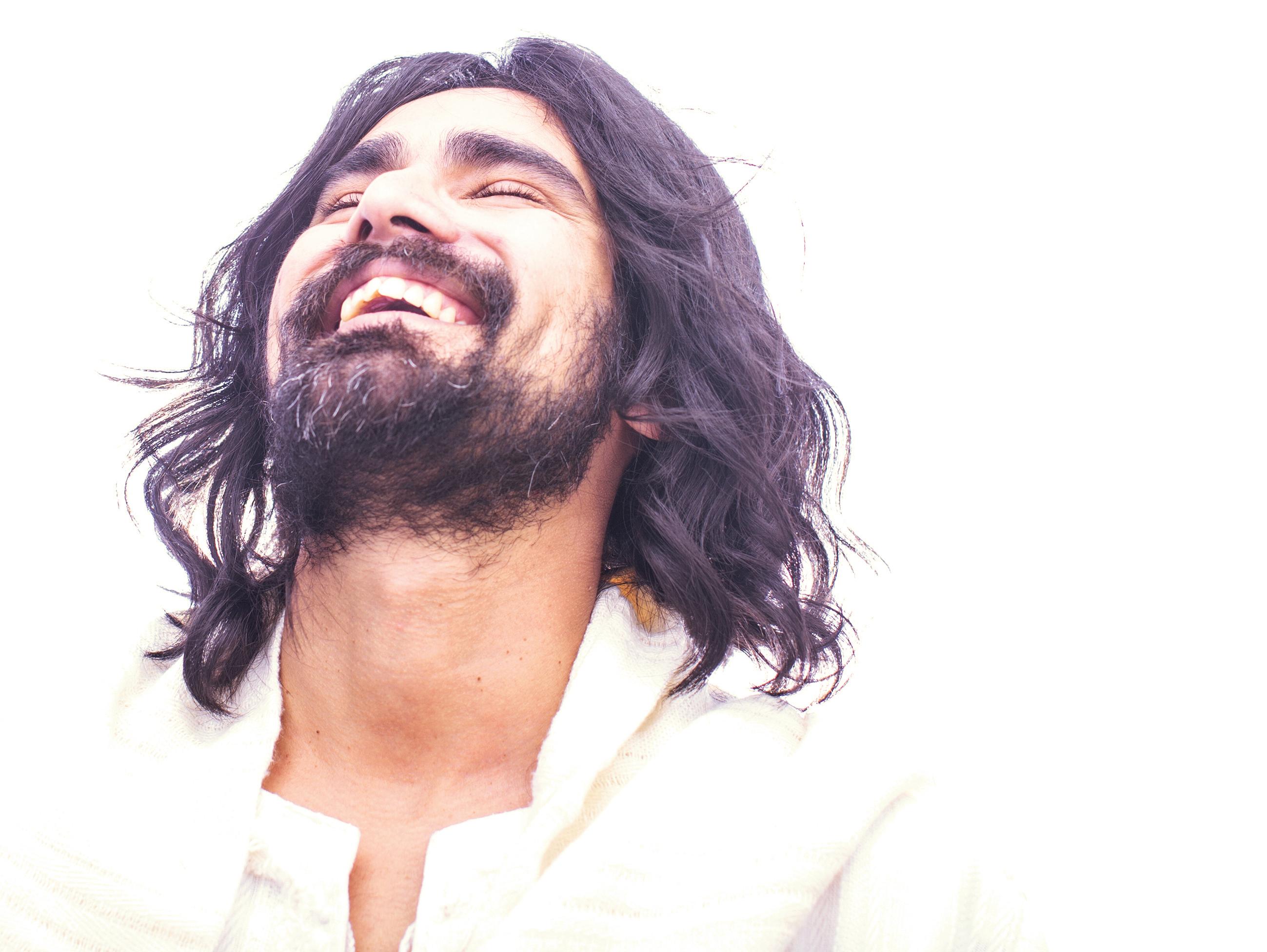
APRIL 2017 51 Continued on next page
©Lightstock
OUR OVERWHELMING VICTORY
Continued from previous page
I’m sure Mary couldn’t begin to fathom the repercussions of what she was experiencing. There’s no way she could have processed all the theological implications of a living, breathing Jesus in that brief, emotionally charged moment. Nor did she have any idea of the place in history she had instantly achieved.
All she knew—all she cared about— was that Jesus, her dearest friend and the kindest man she’d ever known, was alive. It wasn’t until later that she began to see the big picture and grasp the significance of what had happened.

If it’s been a while since you thought about Jesus’ victory over death, let me remind you of three faith-filling truths.
His Victory Was Complete
I think about a car crash victim from our area. His injuries were so extensive he was given little chance of surviving. However, some brilliant doctors did amazing work and managed to save his life. The problem is that he has some mild brain damage and will be confined to a wheelchair for the rest of his life. So yes, in one sense, the doctors won a great victory. But they, the victim, and the victim’s family will tell you that they were hoping for more.
There are many times in life when a partial victory, though disappointing, is still better than no victory. But when it comes to any battle with death, a partial victory is not only unacceptable, it’s impossible. Death has to be defeated completely or not at all, and that’s what Jesus did. There are three ways in which Jesus’ victory was complete.
It rendered death thoroughly impotent—Paul said it this way: “Death is swallowed up in victory” (1 Corinthians 15:54*). I can’t read those words without thinking of a buddy of mine who has a pet snake. (Terrific guy, but he really needs prayer!)
Every so often he feeds his snake a live rat. (Really now, don’t snakes and rats deserve each other?)
The snake swallows the rat whole.
Death has to be defeated completely or not at all, and that’s what Jesus did.
Nothing restricts an animal’s potential like being swallowed whole by another animal. Likewise, when death was “swallowed up,” it was rendered thoroughly impotent.
It will never have to be won again— Most victories are only temporary. Whoever wins the Super Bowl or the World Series this year will have to go out and compete for the championship again next year. An artist who wins the Grammy for Song of the Year this year must try to outdo himself next year. The same is true for an actor who wins a coveted Oscar.
And every patient who is given a clean bill of health from his doctor today knows there will be illnesses he’ll have to face in the future. But never again will our Lord have to contend with sin and death. Romans 6:10 says, “He died once to break the power of sin. But now that he lives, he lives for the glory of God.”
Everyone can have access to it—So many things in this world are private or restricted. You can be turned away be-
cause you don’t have a ticket, a membership, a reservation, an important friend, a recognizable name, the proper clothing, or a couple of C-notes to bribe the doorman. But when it comes to our Lord’s victory over death, there are no goons standing at the door to keep people out. Hebrews 7:25 says, “He is able, once and forever, to save those who come to God through him.”
His Victory Was Conspicuous
The second great faith-filling fact about our Lord’s victory over death is that it was accomplished openly, for all to see. His birth wasn’t. He came into the world quietly . . . so quietly that the people staying next door at the Bethlehem Bed & Breakfast had no idea what was happening. But his conquest of death was the centerpiece of his life’s work and was put on open display. Look at this telling passage from Paul:
I passed on to you what was most important and what had also been passed on to me. Christ died for our sins, just as the Scriptures
52 CHRISTIAN STANDARD
When it comes to any battle with death, a partial victory is not only unacceptable, it’s impossible.
said. He was buried, and he was raised from the dead on the third day, as the Scriptures said. He was seen by Peter and then by the Twelve. After that, he was seen by more than 500 of his followers at one time, most of whom are still alive, though some have died by now. Then he was seen by James and later by all the apostles. Last of all, as though I had been born at the wrong time, I also saw him (1 Corinthians 15:3-8).
The key phrase there is “most of whom are still alive.” In essence, Paul was saying, “If you don’t believe me, go talk to the hundreds of people who saw him with their own eyes.” We might smell something fishy if all the supposed witnesses just happened to be dead. Or if there were only one or two witnesses, we might suspect some sort of bribe.
But it’s hard to imagine even the most resourceful person being able to enlist hundreds of people in a conspiracy.
Paul also points out that all the apostles were eyewitnesses of Christ’s resurrection. Our strongest evidence that Jesus’ followers weren’t just fabricating a juicy story is the fact that they were willing to be persecuted and, ultimately, to die for it.
Early church tradition says Mark died in Alexandria, Egypt, after being dragged by horses through the streets. It also suggests Luke was hanged in Greece and Peter was crucified upside down because he didn’t feel worthy to die the way Christ did.
As the rows of white crosses in any military cemetery would prove, lots of people are willing to die for their heartfelt convictions. But few, if any, would knowingly die for a hoax.
Several times in my life I’ve chosen to accept somebody’s word even though the person had no hard evidence to back up the claims. Usually, I’ve done this because of some emotional attachment to the person. In other words, I wanted to believe. But I’m forced to admit that at least half the time, my faith was misplaced and the person turned out to be less than honest.
I am deeply grateful to God that he accomplished the crowning work of his re-
demptive plan conspicuously . . . that he gave us lots of evidence, not just to bolster our faith, but to keep us from living with the gnawing fear that we’re being hoodwinked.
His Victory Is Conditional
The third great faith-filling truth about our Lord’s victory over death is that any of us can share in it on one condition. That condition is clearly stated in 1 John 5:11, 12: “This is what God has testified: He has given us eternal life, and this life is in his Son. So whoever has the Son has life; whoever does not have God’s Son does not have life.”
Peter echoed the idea in Acts 4:12. Speaking of Jesus, he said, “There is salvation in no one else! God has given no other name under heaven by which we must be saved.”
Paul says in Romans 8:37 that “overwhelming victory is ours through Christ, who loved us.” The word overwhelming makes all the difference. It reminds me
that the words barely, close call, or by the skin of your teeth do not apply to my victory in Christ. This is what enables me to relax and enjoy the ride.
So many Christians seem to be afraid that they’re going to squeak into Heaven under the wire, if at all. Just ask the next Christian you see if he’s going to Heaven. There’s a good chance he’ll shrug and meekly say, “I hope so.”
Not me.
I believe my victory is overwhelming.
But not because of me.
My victory is overwhelming because of Jesus, who he is and what he did. It’s all overwhelming.
So how could my victory in him be any less?
*All Scripture quotations are from the New Living Translation of the Bible.
Mark Atteberry is the preaching minister at Poinciana Christian Church, Kissimmee, Florida. This article is adapted from his book, Free Refill, published by Standard Publishing in 2007.

APRIL 2017 53
“When I incorporated my own doubts, confusions, and shortcomings into the lesson plan, it suddenly became a 12-week study.”
A New Politic
BY JOE BOYD
In the early 1980s, Speaker of the House of Representatives Tip O’Neill popularized a phrase that has stayed in the American lexicon ever since: “All politics is local.” I find that phrase moderately comforting at this time in American history when our political dialogue seems to have gone off the rails.
I’m an advocate for individuals being politically active at national, state, and municipal levels. I also respect those who are less active for calculated reasons. That said, I have come to believe the church cannot afford to be inactive in the most local of contexts. This may mean formal involvement in community forums and school boards, but I think there is a “politic” even smaller and more important than that.
Affairs of the City
Words change emphasis through time, of course, but I use the word politic (singular) to hark back to the concept’s original meaning. Literally, politic means “the affairs of the city.” It’s everyday community life.
The more we begin to see people living next to us as people, the less we become entrenched idealogues. This is true on both sides of the aisle. When our held-firm political ideals are met face-to-face with a human being, something most unexpected tends to happen. To put it eloquently, we chill out.

If we look at some of the political hot buttons that most divide us as opportunities to “go local,” communities can begin to change. The most important question to ask is often, “Do I have a true friend who happens to be . . . ?”
Do I have a friend who happens to be Muslim? Once you do, things start to recalibrate.
Do I have a friend who happens to be transgender? I do. It has made what I thought was a fringe behavior something very real and important to me.
Do I have a friend who happens to be gay?
Do I have a friend who happens to know firsthand the reality of systemic poverty?
Do I have a friend who happens to be addicted to drugs?
Do I have a friend who happens to be very wealthy?
Do I have a friend who happens to have a special need?
Do I have a friend who happens to be in the United States illegally?
Do I have a friend who happens to be an outspoken atheist?
Do I have a friend who happens to be much more conservative than I?
them policies to be debated, we can be as hateful to them as we choose.
Jesus, the Operative
Jesus changed everything. He was the rabbi in the middle of the party culture, the guru among cheaters and liars, the holy man who befriended and empowered prostitutes.
Jesus was a friend of “sinners.” It should be noted that, though Jesus would sometimes use that word as a springboard for his teaching, it was originally introduced by his enemies to discredit him. Jesus’ enemies saw him with the “less than” people and immediately labeled the outcasts as “sinners.”
Clearly, Jesus saw sin in people and in the world, but he did not see it as his selfrighteous opponents did. The Pharisees of Jesus’ day were similar to the immovable political pundits on our cable news networks today. They are the conservatives who see every liberal as ridiculous or the liberals who see every conservative as ignorant. Labeling people is without question the easiest way to dehumanize. Once we dehumanize people and make

Jesus was arguably the biggest political operative in all of antiquity. You could make a case he still is today. Remarkably, he chose to keep his politic local even though he could have made many power plays. (I happen to believe this is the main point of the temptation narratives in the Gospels.) He loved those in front of him with reckless abandon. He confronted the abusers of power to their face, not behind their backs. Yes, he was executed as a threat to the Roman Empire—but all he did was love those in Galilee and the surrounding areas. That’s the most dangerous sort of politics.
For those of us who follow him, we are called to be friends of the ones others may call “sinners.” It’s the only way to change the world because all politics is local . . . and personal.
54 CHRISTIAN STANDARD
Joe Boyd is founder and president of Rebel Pilgrim Productions, Cincinnati, Ohio.
Jesus was arguably the biggest political operative in all of antiquity.
CULTURE WATCH
©Design Pics/Thinkstock
Personal Dramas, Universal Issues
BY LEROY LAWSON
Being Mortal: Medicine and What Matters in the End
Atul Gawande
New York: Metropolitan, 2014
The Arsenal of Democracy: FDR, Detroit, and an Epic Quest to Arm an America at War

A. J. Baime
Boston: Houghton Mifflin, 2014
Atul Gawande’s Being Mortal is a book for everyone. But everyone won’t like it.

It’s for everyone because it’s about dying and dying is for everyone. Everyone won’t like it because it’s about honestly accepting dying, even if you’re a doctor and you’re supposed to be against it.
Dr. Gawande is the surgeon son of physician parents. He is proud of his heritage and his calling. After 20 years in his own medical practice, however, he concludes that in many ways, especially when it comes to caring for the dying, doctors get it wrong. Committed to extending life as long as possible and by every possible means, they refuse to accept the fact that in the end, “we just fall apart.”
As we disintegrate, we run to our doctors to fix the failing parts. And the doctors comply: pills for this, canes or prostheses or wheelchairs for that, surgery for the other, with a covering of narcotics to mask the pain. What they don’t do is speak to the real issues of well-being for the patient, and that is “about the reasons one wishes to be alive.”
The seldom-asked question is why? Why take chemotherapy if the best it can offer is a few more months? Why use more desperate measures if the falling off of the quality of life can’t be stopped? Why incarcerate in nursing homes and hospitals where the top priority is the patient’s safety when the patient’s top desire is autonomy, even when that means taking risks? “One has to decide whether one’s fears or one’s hopes are what should matter most.”
The debate over the best care for the terminally ill, he says, “is about what mistakes we fear most—the mistake of prolonging suffering or the mistake of shortening valued life.” Tough call.
Here is where one of my own nagging questions comes in: Why is it we Christians, who say we believe in a Heaven where things are better than they are here, call for the latest extraordinary measures (chemotherapy, surgery, radiation) to bargain for a few more months even if these measures engender increased suffering and loss of autonomy? What are we afraid of? If it’s true there are worse things than
If there are worse things than death, then is it possible that turning our life decisions over to the medical profession may not be in our best interests?
death, and there are, then is it possible that turning our life decisions over to the medical profession may not be in our best interests? Just asking.
Dr. Gawande, of the medical profession, is asking the same questions.
Full of eye-opening research and riveting storytelling, Being Mortal asserts that medicine can comfort and enhance our lives even to the end, providing not only a good life but also a good end. It’s just that what it can do it often doesn’t do, thus bringing about the worst of results with the best of intentions.
This book held me spellbound in part because of the author’s depictions of sev-
There’s a Sheep in My Bathtub: Birth of a Mongolian Church Planting Movement
Brian Hogan
Bayside: Asteroidea Books, 2008
eral patients whom he has guided (or, he confesses, misguided) through their final days. One of them was his own father. The other reason for my appreciation: between us (counting our stepparents), Joy and I have walked through the final stages with seven parents. We have lived these pages. Before long our children will be faced with what to do with us. I hope they read this book.
A Complex Tale
When I started reading A. J. Baime’s The Arsenal of Democracy, I didn’t intend to review it in this column. It wasn’t that long ago I wrote a few words about David Halberstam’s The Reckoning, his retelling of the American automakers’ nearly disastrous slide toward obsolescence before Japan’s wake-up call in the 1970s and 1980s. I thought that was enough about Detroit for awhile. But then I got caught up in Baime’s book, which takes us to an earlier, more muscular Detroit—back when a worried President Franklin D. Roosevelt, eyeing the seemingly unstoppable Nazi juggernaut, challenged America’s industrial giants to harness their enormous potential to stop Hitler and save the allied nations.
This is a complex tale. There are good guys and bad guys, of course, but sometimes they are the same guys. Take Henry Ford, for example, indisputably one of the greatest industrial leaders in our history. A good guy. But he’s also the same Henry
APRIL 2017 55
FROM MY BOOKSHELF
Continued on next page
PERSONAL DRAMAS, UNIVERSAL ISSUES
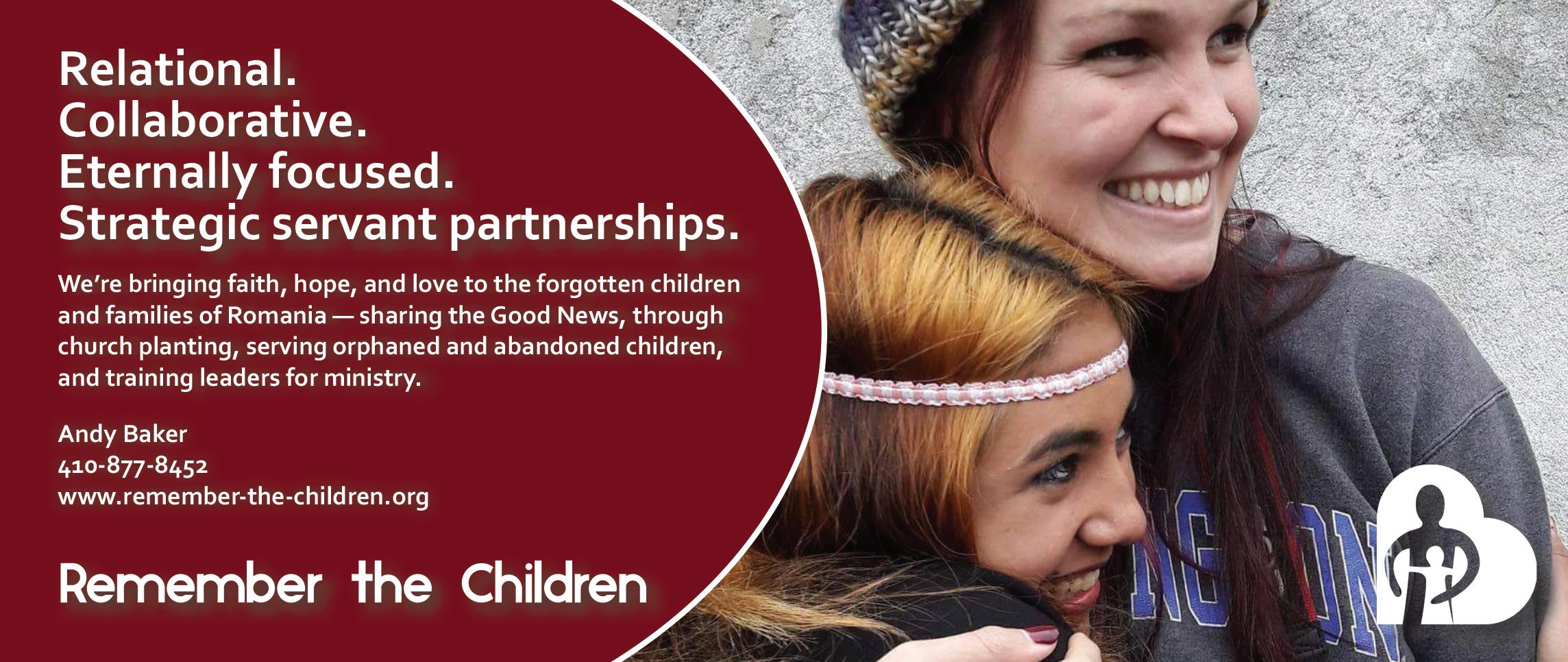
Continued from previous page
Ford who hated Jews, who hired thugs to run his company, who humiliated and very likely drove his son Edsel to his early grave, and who stood against anything Roosevelt wanted just because Roosevelt wanted it.
And there is Henry’s Ford Motor Company’s herculean efforts to build bombers (the famed B-29, the “Liberator”), a result of Edsel’s determination to convince his father to do the right thing even if it was what Roosevelt wanted. But this same company had plants in Europe that cranked out war materiel for the Nazis. A complex story.
I was equally fascinated by the two focal points in the book. First, the stunning transformation of our sleepy, isolationist American-first-and-only, still-climbingout-of-the-depths-of-the-Depression nation into the world’s leading superpower in just a few short years; and second, the primordial contest between generations, in this case between an aging, slippinginto-dementia titan of industry and his gentler, more-in-touch, long-suffering son. It’s a drama worthy of Greek tragedy.
Missionary to Mongolia
A friend passionate about church growth pointed me to Brian Hogan’s There’s a Sheep in My Bathtub, which addresses two of my longtime questions: (1) What is the best way to grow a church; and (2) What kind of leader is required to get the job done? Don’t let me mislead you though. This isn’t a how-to treatise.

Rather, it’s a gripping tale of an intrepid, faith-filled family who followed God’s call from a comfortable American life to Mongolia (yes, Mongolia!), where there was no church and where the nationals assumed that all white-skinned visitors were Russians, which did nothing to help their evangelistic endeavors.

Against incredible odds, the Hogans shivered through subzero temperatures (outside and inside), battled corrupt government officials, learned the real meaning of spiritual warfare, overcame the hostility of distrusting fellow missionaries who looked askance at these youngsters with their newfangled techniques, and ate foods their untutored digestive systems rebelled against. These and many more were the challenges they had to overcome. And they did.
Theirs is a gripping story. But it is also a case study in what happens when you take the New Testament seriously as the model for church planting. The Hogans rightly believed they should not simply recreate an American church (with all the cultural adaptations that make it distinctly American). It had to be Mongolian. So they leaned heavily on the earliest church as described in Acts.
They applied the basics: the apostles’ teaching and fellowship, the breaking of
bread and prayer, amazing generosity, reliance on the Holy Spirit, and discipling native leaders. So simple. So powerful.
What the earliest church lacked was as important as what it had. It had no buildings, no ecclesiastical structure, no extra-biblical manual of instructions, no seminaries or artificial educational standards for the leaders. But it did have the guidance of the Holy Spirit, signs and wonders that left people in awe, a deep commitment not only to Jesus but to one another. And it had the flexibility to be adapted and adopted by cultures as different as, say, middle-class America and rural Mongolia.
Hogan recounts with heart-wrenching honesty the birth and death of their son Jedidiah, the first American born—and just weeks later buried—in Mongolia. Reading this story reminded me of other missionaries I’ve known who buried a child on the field.
The sacrifice of a child is not required by missionary manuals; it is a reminder, though, of what price may have to be paid by anyone who sings with conviction, “I’ll go where you want me to go, dear Lord, I’ll do what you want me to do.”
56
LeRoy Lawson serves as international consultant with CMF International.
CHRISTIAN STANDARD
Slow to Tweet
BY EDDIE LOWEN
This is no self-righteous rant about abandoning social media. But I do wonder if I—and many Christians I encounter online—have always thought through the implication of what we post.
There were no newspapers, radios, or TVs. No blogs, podcasts, or social media. Sending a letter to 100 people meant scratching it out on parchment 100 times (that was a punishment when I was in elementary school).
E-mail? Tweets? Voice mail? Unimaginable.

In an age when no instant or mass communication tools existed, when fewer people lived on earth than in the United States today, James wrote, “Everyone should be quick to listen, slow to speak” (James 1:19).
If that guidance was needed before people posted their words online freely and frequently, how essential is it today when our words are so readily broadcast to everyone we know—and potentially around the world (with 40 times as many inhabitants on the planet)?
I Post, Therefore I Am
In early 2009, as Twitter’s servers crashed under the volume of its explosive popularity, Psychology Today tried to explain the appeal. The writer offered a familiar triangular chart featuring Abraham Maslow’s Hierarchy of Needs and included phrases like existential anxiety and social recognition, along with words like self-esteem and narcissism.
Twitter feeds our hunger for celebrity, the magazine said. I didn’t take time to research whether or not they tweeted the article.
Cynical commentary about our use of social media has been offered up many times since the twitterverse was created. And, all this could serve as a setup for my own pretentious homily about social media. But I don’t plan to disavow social media, and neither do many others, regardless of what the cynics preach. As for
me, I think it’s better for us to be in the game. Today’s communication platforms are, like every other technology, capable of magnifying blessing or pain, love or hate, truth or falsehood.
My suggestion is that we ask ourselves WHY we post, why we post WHAT we post, and why we post AS OFTEN as we post. Meditating on these questions long enough can only help us. I’m thinking of questions like these. What are my motives for posting this? Jesus taught that our words reflect the content and condition of our hearts. Whether written, typed, spoken, or posted, words always say something about the speaker. Words posted on social media often reveal insecurity, graceless attitudes, and dysfunctional ways of relating to others.
I’m grateful for people who know right from wrong, but how did we miss the memo on Jesus’ condemnation of a judgmental spirit? This principle was recurring in his teaching and obvious in his example. Judgmental people do not bring glory to God.
I’m amazed by the number of Christians who relate to the world online completely unlike the way they relate in person. Face-to-face, they seem thoughtful and gracious, perhaps even reticent. Online, their style is slash-and-burn. They speak from a posture of moral superiority.
When we communicate that way online, the impression (true or not) is that we wish to bring glory to ourselves. At best, it’s clueless and inconsistent. At worst, it’s arrogant and counterproductive. Our pejorative statements are often a sign of our perverted spirituality.
What would happen if this post were widely seen? Justine Sacco made an offhanded joke on her Twitter account about AIDS victims as she boarded an international flight. It was sarcasm intended to portray the lack of grace shown to many AIDS patients. Besides, Justine’s mere 130 followers knew her well enough to
APRIL 2017 57 MINISTRY TODAY
Continued on next page
SLOW TO TWEET
Continued from previous page
understand her meaning.
However, when Justine reached her destination, she turned on her phone and discovered she’d been retweeted, misunderstood, and vilified. She became Twitter’s most hated person that day. People on Twitter were so outraged, they lobbied her and her employer. Justine was unemployed before her plane landed.
Very few of us imagine how our online words might be interpreted if they suddenly went viral. Two years ago, my son told me he reviewed and deleted numerous past social media posts. He said, “I was like such a jerk,” and asked, “What was I thinking?”
It’s an important question. Thanks to an app called Timehop, I review things that I posted on today’s date as far back as 7 or 8 years ago. Often I find myself shaking my head. I was posting long before I asked and answered some important questions.

Here’s a guiding word through which we can filter our posts: “Do not let any unwholesome talk come out of your mouths, but only what is helpful for building others up according to their needs, that it may benefit those who listen” (Ephesians 4:29).
So many social media posts are about the originator’s need to be heard, not about building others up.
How frequently should I post? At a training event for church leaders, a social media expert encouraged pastors to post multiple times a day, every day. It is needed, he explained, to build a brand or platform. But there was no guidance or discussion about the whole idea of setting out to build a bigger online presence. To be clear, it seems to me there is a positive reason for trying to reach more people with our voices. But at what point do we accept the realm of influence God has given us?
I’m not trying to Jesus-juke anyone with good things to offer and pure motives for doing so. But I hope I can find a way to genuinely humble myself before the Lord and trust him to lift me up where and how he sees fit.
Perhaps that’s easy for me to say because I have less to offer than others and,

therefore, less of a burden to offer it. But I think providence is still a thing. I want to trust God’s wisdom concerning the degree of my visibility.
Would I say this in any other forum? If it would appear desperate or dopey to say something in a crowd of people at church or at the mall, why would I say it on social media?
Me Too
“My name is Eddie and I’m a user . . .” of Twitter, Facebook, Instagram. I’m pretty digitized and not even close to being unplugged. There are a few hundred e-mails in my in-box. I recently counted the e-mail accounts on my phone: six (though my phone service provider created two on my behalf for reasons I can’t explain). I use one e-mail address for work, one for personal items, and one for people I don’t like so much! I recommend it. Maybe I’d be wiser or saintlier if I attempted to make a case for nixing digital media altogether. It would be futile—and I’m not there. In the world, not of it, was the way of Jesus. The world is present on social media, so you and I should be there too.
But to be salt and light, let’s eliminate the “morality rant” posts, the “complaintbox” posts, the “hell-in-a-handbasket” posts, the “look how uptight I’m not” posts, the “look who I’m with now” posts, the “look where I’m traveling because I’m important” posts, the “I’m humbled that you thought my sermon was awesome” posts, the “they’re stupid, I’m smart” posts. . . .
Let’s, at least, ask if something will be built, other than our own platform. And let’s remember what happened to Haman in the book of Esther when he built one. And now, excuse me. I have some deleting to do.
58 CHRISTIAN STANDARD
Eddie Lowen, lead minister of West Side Christian Church, Springfield, Illinois, writes the “Ministry Today” column semimonthly in Christian standard
. . .
To be salt and light, let’s eliminate the “morality rant” posts, the “complaint-box” posts, the “hell-in-ahandbasket” posts, the
PREACHING
The Best Sermon I’ve Ever Heard
BY ARRON CHAMBERS
Christian leaders, some of them preachers themselves, tell us about a sermon they can’t forget— and maybe you won’t either.
Tim Sutherland
Tim Sutherland is a third-generation Christian church minister. (His father, Joe, taught at Emmanuel School of Religion, Johnson City, Tennessee, for many years and his grandfather graduated from Johnson Bible College— now Johnson University—in 1921.) He was baptized at Greenwood Christian Church in Canton, Ohio, in 1970. Tim was a teaching team leader for many years at Community Christian Church, Naperville, Illinois, and is currently president and CEO of Sutherland Strategic Staffing, a pre-employment assessment service. He is also a licensed marriage and family therapist in Knoxville, Tennessee.
Tim’s Best Sermon: The best sermon I’ve heard on Christmas is by Jack Hayford, former minister of Church on the Way of Van Nuys, California. The sermon, “I Wish You a ‘Mary’ Christmas,” can be purchased at www.jackhayford.org/store/i-wish-you-amary-christmas-1/.
Why Tim likes this sermon: “This sermon draws an incredibly striking parallel between the physical reality of the incarnation and the spiritual reality of becoming a Christian. It’s a brilliant, unique insight into the very familiar Christmas story that makes for a very different, very powerful Christmas sermon.”
James McMillion
After hitting rock bottom in life, James McMillion came to Christ with the help of two godly men who boldly preached God’s Word. James has committed his life to helping others through preaching and teaching. He serves as senior pastor of the Petersburg (Illinois) Church of Christ and is pursuing a doctor of ministry in preaching at Lincoln Christian University. His partner in life and ministry is Beth, and they have two beautiful children.
James’s Best Sermon: The best sermon I’ve ever heard on money and happiness was preached by Nate Ross, associate pastor (soon to be lead pastor) of Northside Christian Church in New Albany, Indiana. You can view the sermon at http://bit.ly/2iNraMP.
Why James likes the sermon: “Nate exposes the familiar lie that money can somehow bring happiness. He uses humor and real life experience to get to the root of the issue: our values, view of money, and submission to God. He also offers some practical guidance on how we can honor God with the resources he has entrusted to us and the joy and freedom that can come as a result.”
Alan Tison
Alan Tison served for 30 years as both an associate minister and a senior minister, and now serves as director of advancement at Johnson University Florida. In his role, Alan has opportunities to hear messages from preachers all over the state of Florida.

Alan’s Best Sermon: The best sermon I have heard on Heaven is “Living the High Life” by John Hampton, lead minister with Journey Christian Church (Apopka, Florida). You can view this sermon at http:// journeychristian.com/sermon-archive/ living-the-high-life/.
Why Alan likes this sermon: “This message was so meaningful to me because in May 2016, I lost my wife, Kathy, to a battle with cancer. John’s message from Revelation 21:1-5 was a great encouragement and reminder of the overcoming power of God.
Jonathon Dawson
Jonathon Dawson grew up going to many different churches, but in high school he attended Gateway Christian Church in Mount Sterling, Kentucky, where he started dating the preacher’s daughter. Jonathon worked at Toyota Motor Manufacturing for almost 13 years before attending Louisville Bible College. After graduation, he accepted a call to Snellville Christian Church in metro Atlanta. Jonathon and his wife of 23 years, Carrie, have three children: Chase, Emy, and Canah.
Jonathon’s Best Sermon: The best sermon I’ve heard on race relations and law enforcement is by Kelly Carmichael, preaching minister with First Christian Church, Baldwyn, Mississippi. The sermon is available at www. youtube.com/watch?v=bLb9ez9TL-4&t=4s.
Why Jonathon likes this sermon: “This sermon was incredibly powerful for two reasons: (1) it was delivered the weekend after the shootings of the Dallas police officers in July [2016] when tensions were very high, and (2) Kelly has experience in law enforcement, so he was able to give a very unique and compelling perspective.”
Arron Chambers, a Christian standard contributing editor, serves as lead minister with Journey Christian Church, Greeley, Colorado.

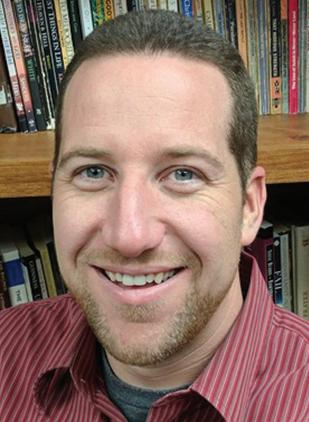

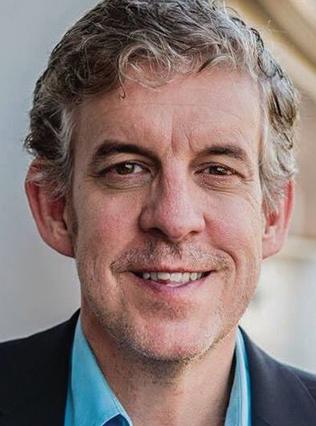
APRIL 2017 59
best practices
COMPILED BY MICHAEL C. MACK
What Is Your Church Doing the SUNDAY AFTER EASTER?
After the high point of Easter Sunday, many church leaders look around the following weekend and, like the two disciples on the road to Emmaus, their faces are downcast (Luke 24:17). That doesn’t need to be the case, says Maurilio Amorim, a writer and CEO of The A Group, a media, technology, and branding firm in Brentwood, Tennessee.

Amorim says he has seen “churches of all sizes compel the ‘Easter crowd’ to return the following weekend and eventually become part of the congregation.” How? Here are a few successful steps churches have used:
1. Plan to start a strategic new sermon series the weekend after Easter. People like being a part of something new, and a series that answers their real faith questions will provide more than just return visits; it may pave the way to start them on a discipleship path.
2. Use strong sermon titles and compelling graphics. Create an emotional tie between the audience and the new sermon series.
3. Take a cue from Hollywood and create a twominute “sermon series trailer” that you show on Easter Sunday. Present the heart of the new teaching series in this promo video and supplement it with good signage, cards, bulletin announcements, and more.
4. Don’t be intimidated by the trailer idea. If resources are limited, do something simple but effective. One example is to shoot a simple “person-on-the-street” video, asking people to respond to a question dealing with your new teaching series.
Get Mobile-Ready for Easter—and All Year Long
Most people today use smartphones, and according to the Pew Research Center (www.pewinternet.org), all age groups and other demographics are using cell phones to get information. The Easter season may be a good time to reevaluate your website and mobile-readiness. At least 41 percent of Americans plan to attend Easter services, according to LifeWay Research (lifewayresearch.com).
One of the first and easiest things you can do, says Kelli Kelly, manager of technology and strategic partnerships at LifeWay, is to make your website mobile-friendly. Be sure people can read the useful information on their mobile devices.
Kelly suggests that churches include these five things on their websites.
1. Church-facility location and service times
2. Staff names and titles (photos and contact information are also beneficial)
3. Information about student ministries (children and youth)
4. Mission and core values
5. Sermon archives
60 CHRISTIAN STANDARD
Outreach magazine (www.outreachmagazine.com)
—
Still Searching for Jesus . . . In Cyberspace
In search engines, such as Google, and on Bible websites, such as Bible Gateway, searches for terms, such as Jesus, Bible, resurrection, crucifixion, and risen, spike during the Easter season. In fact, in 2015, resurrection was the most searched keyword on Bible Gateway, says Aaron Earls, online editor of Facts & Trends (factsandtrends.net).
Google searches for “Jesus” in 2016

Numbers represent search interest relative to the highest point on the chart for the given region and time. A value of 100 is the peak popularity for the term. A value of 50 means that the term is half as popular. Likewise a score of 0 means the term was less than 1% as popular as the peak.
What does that mean for churches and other ministries? Earls suggests two major implications:
1. People are still curious about the death, burial, and resurrection of Jesus. If people are searching for these keywords online, visitors and members probably also want to hear about these topics when they attend church services. Provide what they’re looking for; don’t “chase relevancy or originality by focusing on another topic during Easter,” says Earls.
2. Your church website and social media channels may be prime places to tell the Easter story. Move beyond a static front page on your website and add reflections by church leaders on the significance of the death and resurrection. Write personal observations or even meditations on your social media pages or blog. Link to good Easter resources on the web. And be sure to use hashtags, such as #Easter, #resurrection, and #GoodFriday, to help people in their search for #Truth!
—http://factsandtrends.net/2016/03/23/easter-sparks-online-searches
Getaway Planning
Spending time with God is your priority as a leader. But it doesn’t just happen. Use the following strategy questions to help you plan a time of solitude with God:
• How often will I get away alone with God? (Weekly, monthly, quarterly, annually?)
• How long will I spend alone with God?
• When will I get away to be alone with God? (Be specific!)
• Where will I go?
• What provisions do I need to make for getting away? (Asking for permission, lining up childcare, making financial arrangements, lining up a place to stay, etc.)

On my getaways I take only a few essentials: my Bible, a small notepad and pen, and some water and light snacks.
I do not take any other books or devices besides my cell phone, and I take it only to make emergency calls. I also tell my wife where I’ll be and I utilize a tracking device on my phone— just in case.
These times are refreshing to my soul, they remind me of the calling God has placed on my life, and they revive me for the ministry God has called me to do.
—Excerpted from World’s Greatest Small Group by Michael C. Mack (smallgroupleadership.com/ worlds-greatest-small-group).
APRIL 2017 61
“Prayer is the easiest and hardest of all things; the simplest and the sublimest; the weakest and the most powerful; its results lie outside the range of human possibilities—they are limited only by the omnipotence of God.”
—E. M. Bounds (1835–1913), American author, attorney, and pastor
9 Tactics for Advancing Your Youth Retreat

Youth retreat weekends, whatever the season, “can be some of the biggest momentum gainers (and, simultaneously, the biggest time suckers) in student ministry,” says Josh Schack, student ministry pastor at First Christian Church in Santa Maria, California. He suggests these nine strategies for success:
1. Move from paper to automated registration. Streamline the process with good event-registration software.
2. Encourage early sign-ups with discount pricing. Early registrants get the best prices, and the prices increase as you get closer to the event. This will discourage many last-minute signups.
3. Make your retreat information and details visual. Pages full of type will remain mostly unread, so use infographics as much as possible.
4. Get your leaders on the same page. Meet before the retreat to discuss expectations (the why, how, and what) of the retreat. The end goal is particularly important, says Schack. They need to know “why we’re giving up our weekend to sleep in a room that smells like BO and Fritos.”
5. Take care of your volunteer team. They are giving up quite a bit to “deprive themselves of sleep and hang out with teenagers,” so invest in them. Schack suggests retreat care packages, morning coffee, verbal encouragement, and designated “time off” on
Saturday afternoon as examples.
6. Form team community and identity. Schack offers these ideas: include a fun activity at each leader meeting, have a leaderonly time each day, create staff T-shirts, play games, overcome a challenge, and so forth. By the way, this sense of team identity may be one of your best recruitment tools in years to come!
7. Invite top influencers. Extend a weekend invitation to those people in your church whom other people follow. You will build vision and energy when these influencers return and talk up your ministry.
8. Get free publicity using social media. Parents will be tuning in to your social media over the weekend because they want to see what their kid is doing. Leverage parental interest by posting share-worthy videos and pictures of student activities. When parents repost (and they will!), your ministry receives free publicity with other parents!
9. Share the story. These weekends often bring many lifechange stories. Use every chance you get, through the website, social media pages, testimonies, videos, and more to be sure others hear those stories.
—www.youthworker.com/nine-ways-to-take-your-youth-retreats-tothe-next-level.
62 CHRISTIAN STANDARD best
practices
No Repeat Group Prayer Research Busts Lazy-Teen Myth
Do your group or class members get so caught up in “saying a prayer” and putting it into the right format with the right words that they miss having a conversation with one another and Jesus? Do people refuse to pray aloud because they think they’ll get it wrong? Does your group take prayer requests and then pray them back to God as if he isn’t present? Do people give answers to people’s problems or try to “fix” them during prayer requests?
These activities make it clear on whose power the group members are most reliant. If you know Christ is present with you and his power is with you when you meet, how might you pray differently than you do now?
Here are four tips for making group prayer more Christ-centered and healthy.

1. Remind group members that as you gather in Jesus’ name, he really is there with you (Matthew 18:20).
2. Before you pray, read Matthew 18:20 or 1 John 1:3. Then discuss the implications for group prayer.
3. Remind the group that as you share prayer requests with one another, God is listening, so you don’t need to repeat your prayer requests back to him as if he didn’t hear them the first time!
4. Ask group members to share what’s on their minds and hearts with each other and Jesus at the same time. If they prefer to share their request as a prayer, that is, directed to Jesus, that’s fine. The rest of the group will listen in. If they prefer to share it with group members, that’s OK too. Jesus is present and listening.
Prayer should be the most natural thing Christ followers do in community. Make your prayer time Christ-centered!
—Michael C. Mack
#Ministry Tweets
#GoodFriday”
—@lecrae
“Emotionally
#leadership”
—@anitamburns
A recent study from Barna, in partnership with Youth Specialties and YouthWorks, shows that teens are actively involved in service and volunteer activities, and youth ministry is a principle vehicle through which they serve. At least 68 percent of parents say their teens volunteer at least once every few months (see chart below).
The research also found that the church is central to teen volunteerism. “The church, and youth groups in particular, have a unique opportunity to stand out as an authentic example of love through service by being the hands and feet of Jesus to those in need,” says Brooke Hempell, vice president of research at Barna Group.

Have a ministry tweet to share? Please tag @MichaelCMack, #BestPractices. We may use it in a future issue.
“The best leaders in life are the ones that help release burdens.”
—@benreed
“The difference between the Holy Spirit and the church wifi is that everybody screams if the wifi is gone.”
—@ChrchCurmudgeon
The Social Side of Best Practices
Discover more “best ministry practices” and share your own on our Facebook page: www.facebook.com/ChristianStandardMagazine.

“Encourage your team. Today’s encouragement fuels tomorrow’s motivation.”
—@craiggroeschel
“#Church Secretary: #Pastor I have a problem. Me: What? Her: My email pw has been hacked. This is the third time I’ve had to rename my cat.”
—@First_Jimothy
APRIL 2017 63
“Thank you Jesus for living the life I couldn’t live and dying the death I deserved to die.
healthy leaders root out injustice and remedy it.
AT LEAST ONCE A WEEK 17% AT LEAST ONCE A MONTH 25% ONCE EVERY FEW MONTHS 26% LESS OFTEN 32%
Feeling Spent?
BY JIM TUNE
I encounter a lot of beatup people. The general anxiety level in society is high, and it’s easy to feel anxious even in the best of times. Throw in financial, relational, and other stresses, and it’s easy to feel overwhelmed.
Whenever I encounter beat-up people, or feel like one myself, I like to remind myself of Isaiah’s picture of Jesus: “A bruised reed he will not break, and a faintly burning wick he will not quench” (Isaiah 42:3, English Standard Version).
The image of a bruised reed and a faintly burning wick may seem strange at first. A bruised reed is useless and beyond repair. It’s damaged, good only for the scrap heap. A faintly burning wick is past its prime and ready for extinguishing. The bruised reed is internally damaged; the faintly burning wick is out of external resources.

Most people look at the damaged, the weak, and the tired as expendable. Jesus sees them as valuable. He refuses to give up on them.
In May 2009, a man in deep financial debt in China stood on a bridge contemplating suicide. Police closed the bridge, disrupting traffic for five hours. Suddenly a
Next month in
66-year-old man pushed his way past barriers, reached out to shake the hand of the man considering suicide, and then pushed him off the bridge. Fortunately, the suicidal man landed on an inflatable emergency cushion the police had prepared.
“I pushed him off because jumpers like (him) are very selfish,” the pushy man explained. “Their action violates a lot of public interest. They do not really dare to kill themselves. Instead, they just want to raise the relevant government authorities’ attention to their appeals.”
Jesus does not push troubled people off bridges. A bruised reed he will not break. A smoldering wick he will not snuff out. He is patient and merciful.
I overheard a person in his 20s being referred to as strong and independent. I chuckled. The person does look strong and independent, but also young. It’s easy to feel invincible at that age. By the time we put on a few more decades, most of us know we’re often weak and dependent. When we feel this way, we can be confident Jesus isn’t done with us yet.

Jesus loves the weak and tired. Even better, Jesus is capable of curing and revitalizing them. When the Gospel writer quoted this passage (in Matthew 12:20),
Most people look at the damaged, the weak, and the tired as expendable. Jesus sees them as valuable. He refuses to give up on them.
he did so soon after Jesus healed a man’s withered hand. Jesus not only cares; he restores and heals.
“As a mother is tenderest toward the most diseased and weakest child, so does Christ most mercifully incline to the weakest,” wrote Richard Sibbes. We never have to worry that our weakness disqualifies us. Jesus seems to do his best work with people who feel weak without him.
Feel like a bruised reed or a faintly burning wick? He won’t break or quench you. Jesus isn’t done with you yet.
The Post-Nuclear Family: Dealing with the Fallout
Christian or not, everyone agrees that families are changing today. Next month writer and counselor Paul Boatman reminds us that 40 percent of all births in the United States are to unmarried women. About half of marriages end in divorce. And cohabitation has become the norm for many, not just young adults. How will the church speak to and build up families in a time when families have never been more under attack? Find answers from the writers in our May issue.
ALSO . . . Our annual megachurch issue always has progress reports from more than megachurches. Next month we share last year’s statistics from 315 local congregations. It’s a list you’ll want to see and save.
Get all this and more in our May issue, ready for you mid-April via the Christian standard app for your phone or tablet.

64 CHRISTIAN STANDARD
A DIFFERENT TUNE
©iStock/Thinkstock
®
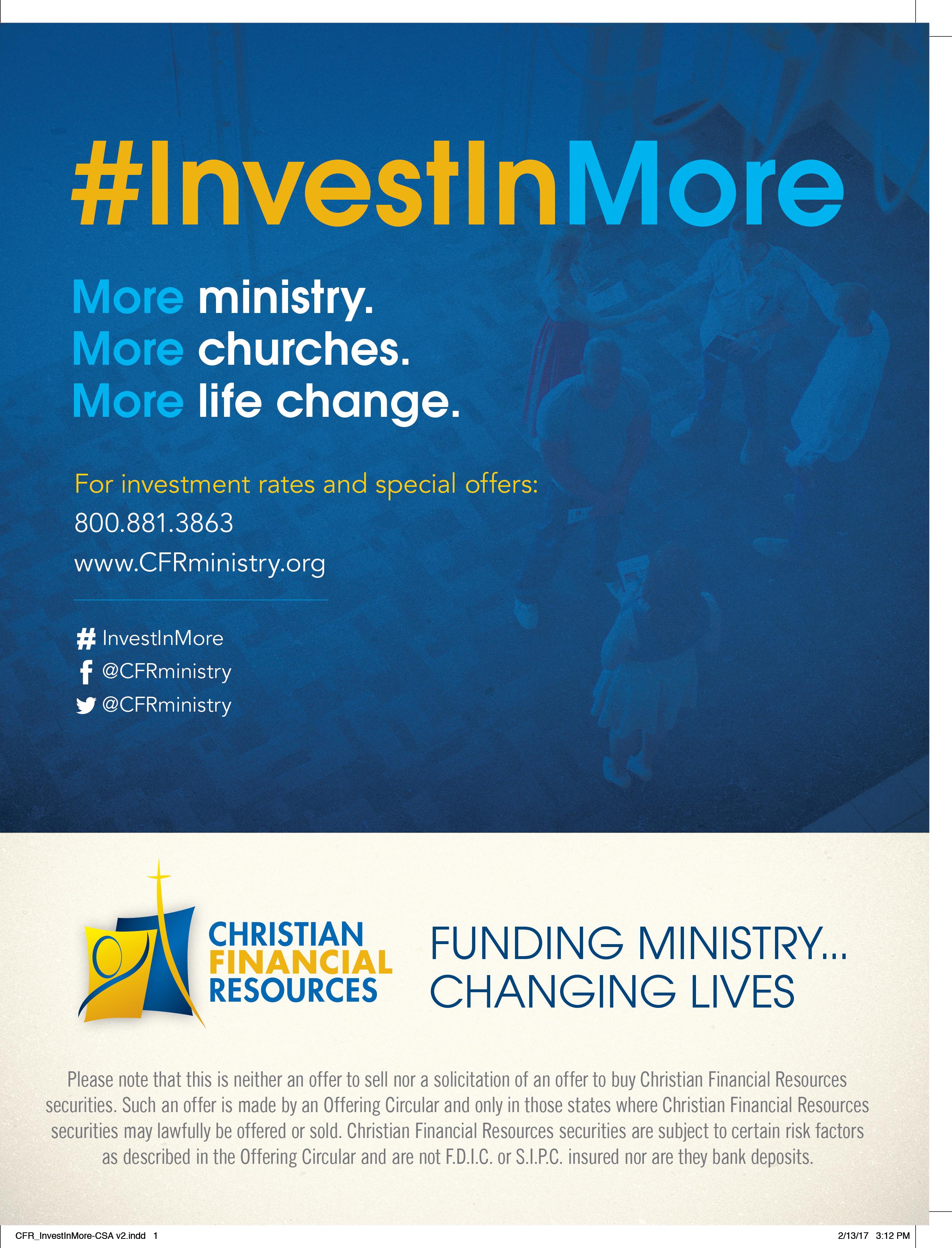


 Mark A. Taylor, Publisher and Editor
Mark A. Taylor, Publisher and Editor
 Jim Nieman, Managing Editor
Rosemary Mitchell, Editorial Assistant
Teresa Callahan, Marketing and Advertising Manager
Scott A. Ryan, Design Consultant
Cover image ©iStock/Thinkstock
Jim Nieman, Managing Editor
Rosemary Mitchell, Editorial Assistant
Teresa Callahan, Marketing and Advertising Manager
Scott A. Ryan, Design Consultant
Cover image ©iStock/Thinkstock


 By Aaron and Diane Lincoln
By Aaron and Diane Lincoln

 By Jeff Faull
By David Wright
By Timothy W. Ross
By Jeff Faull
By David Wright
By Timothy W. Ross


















































































